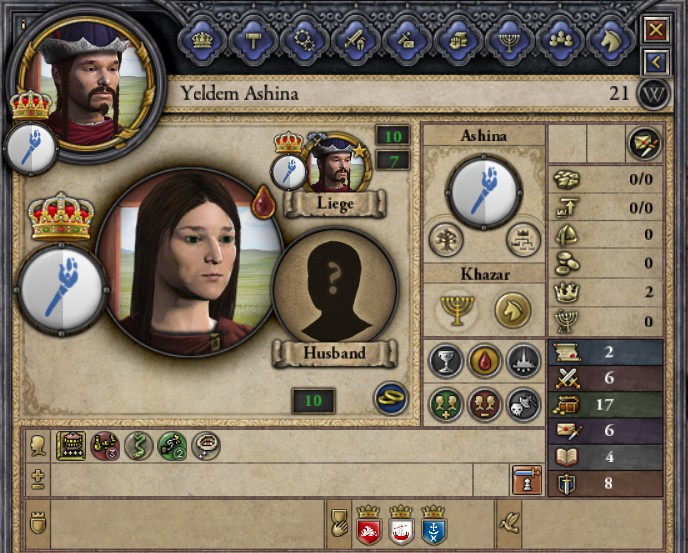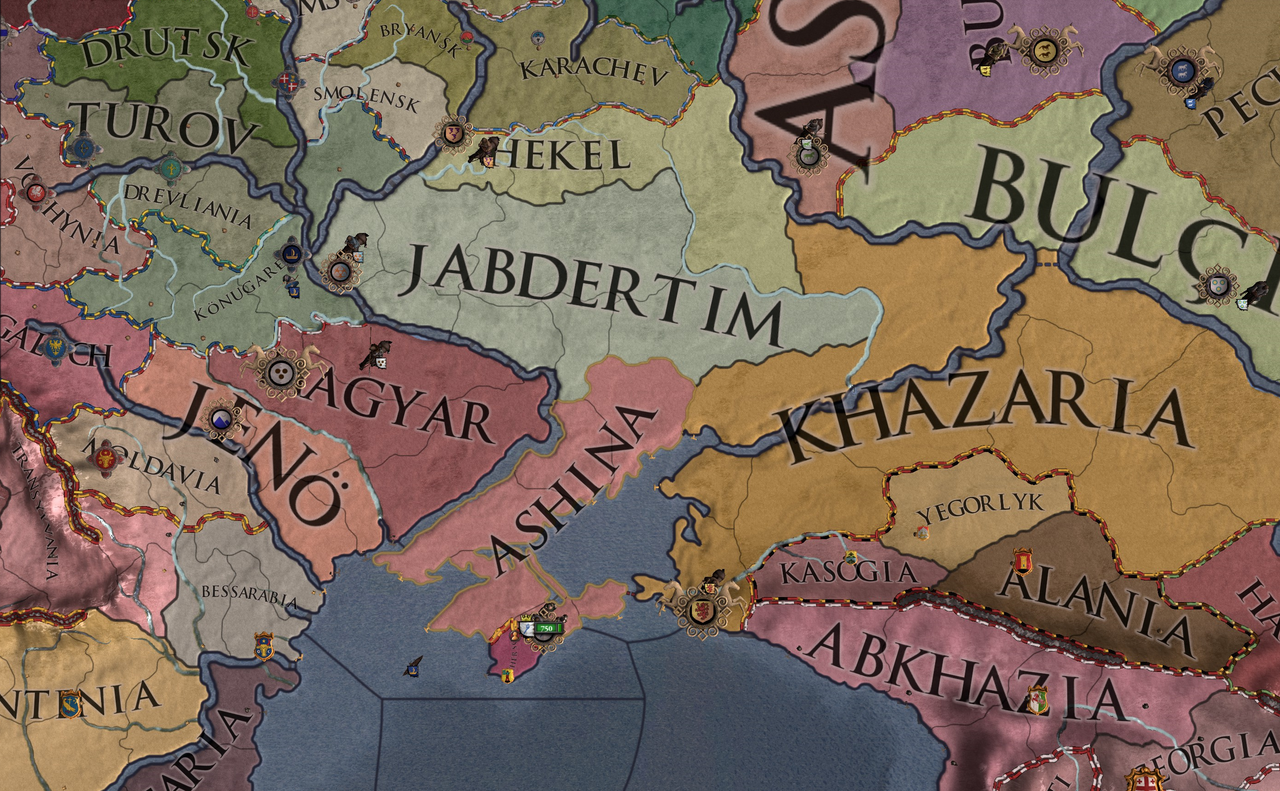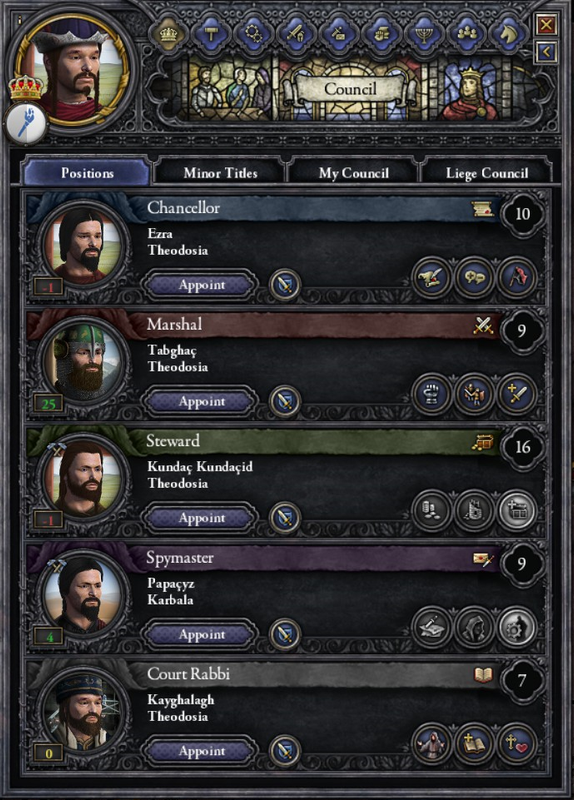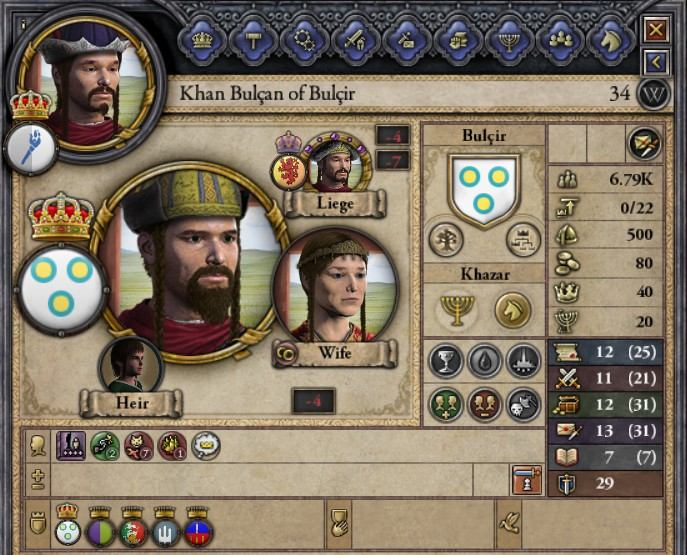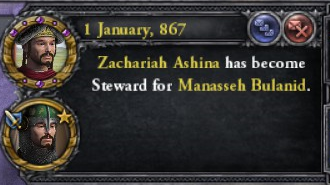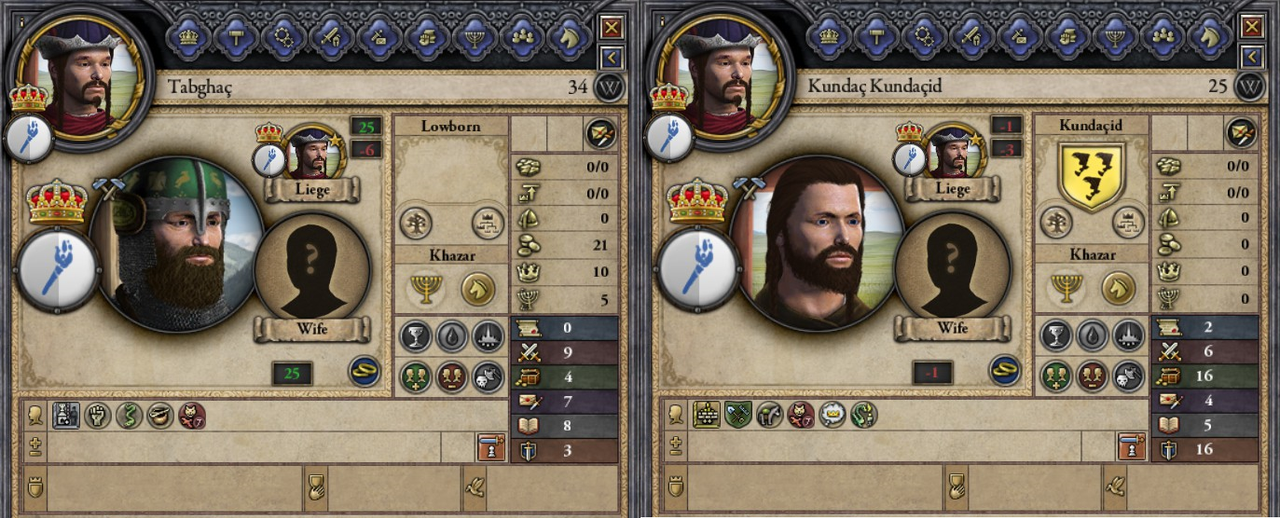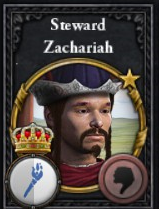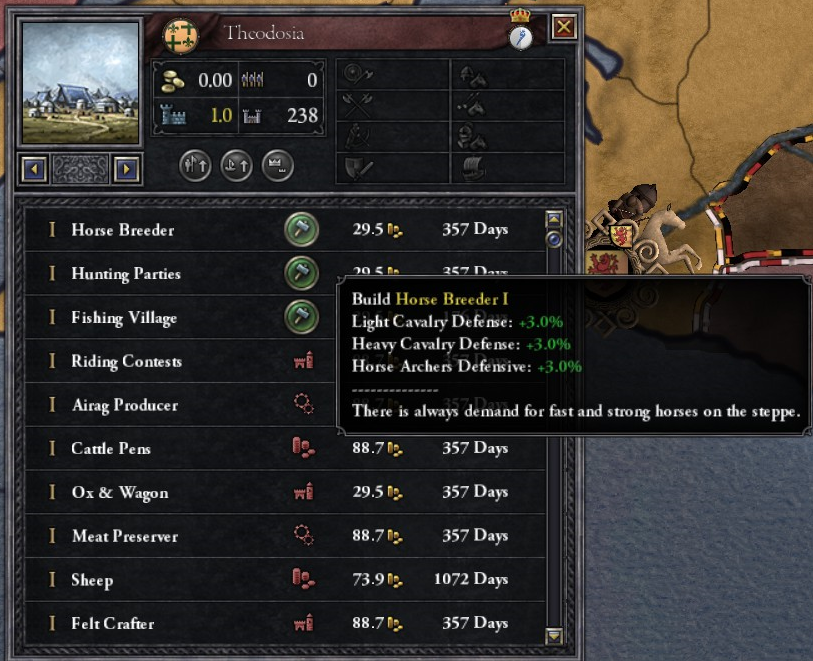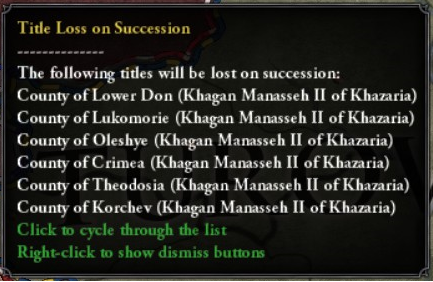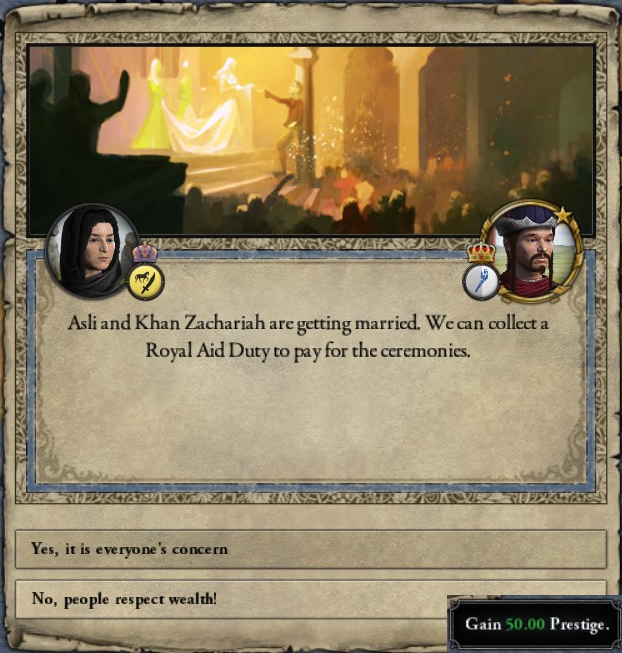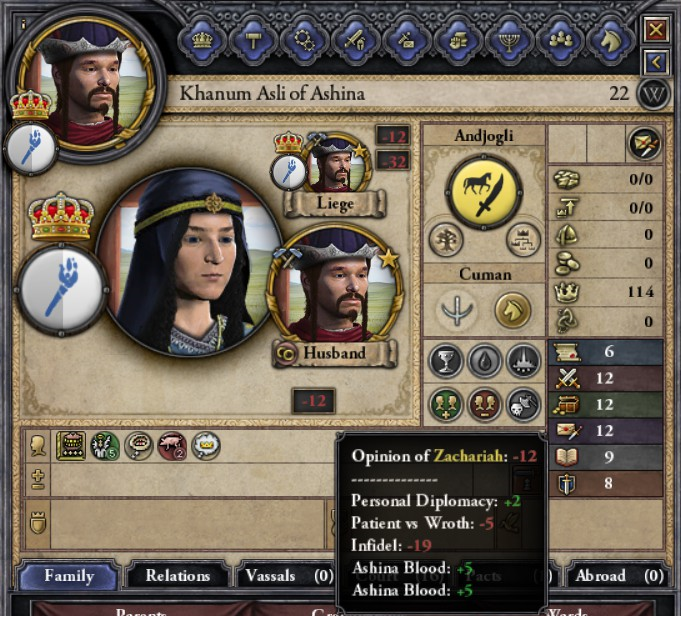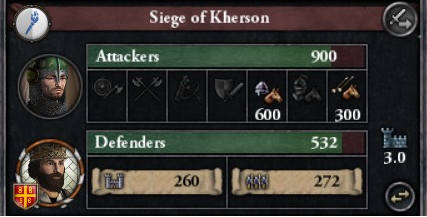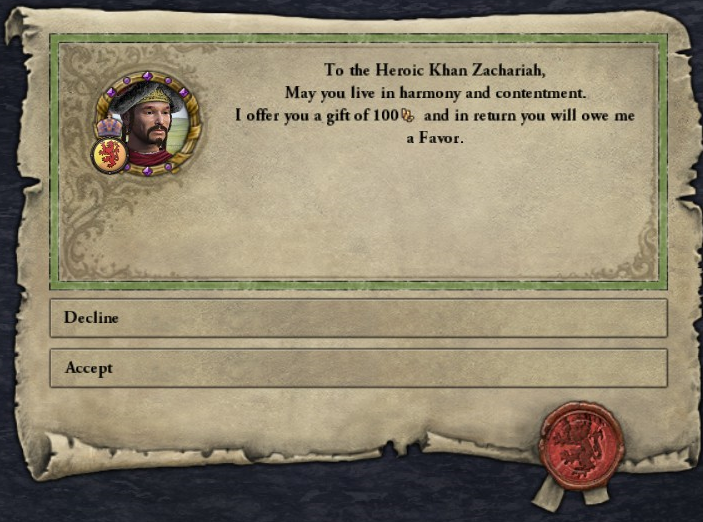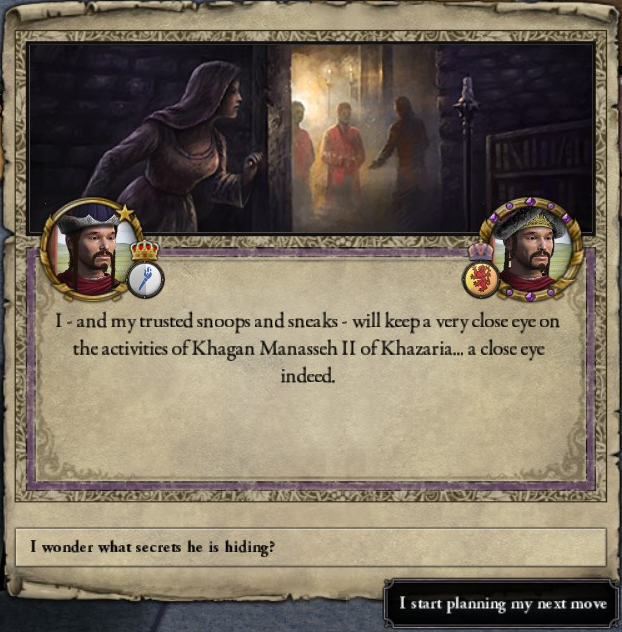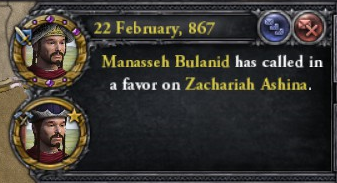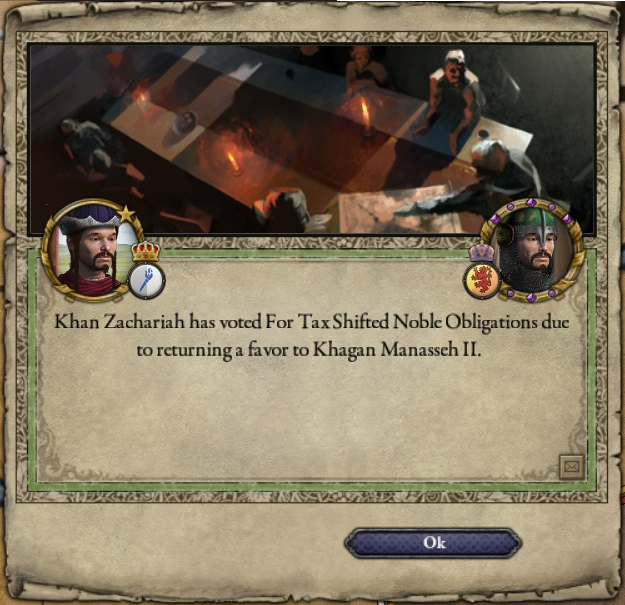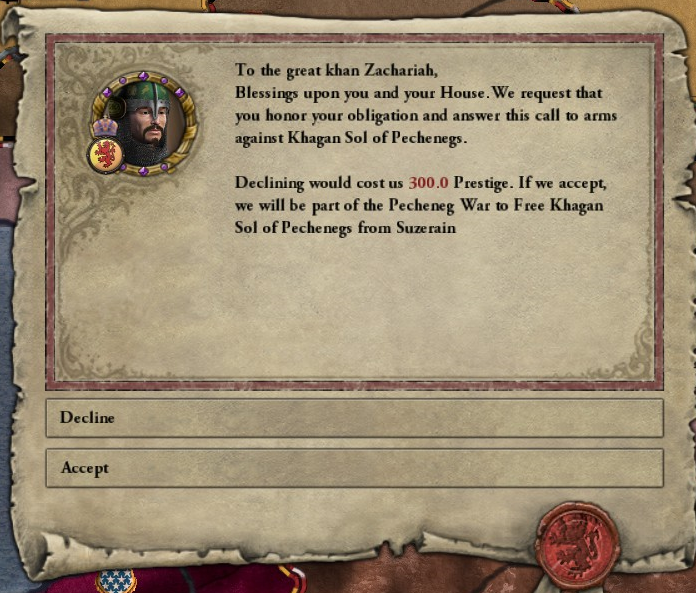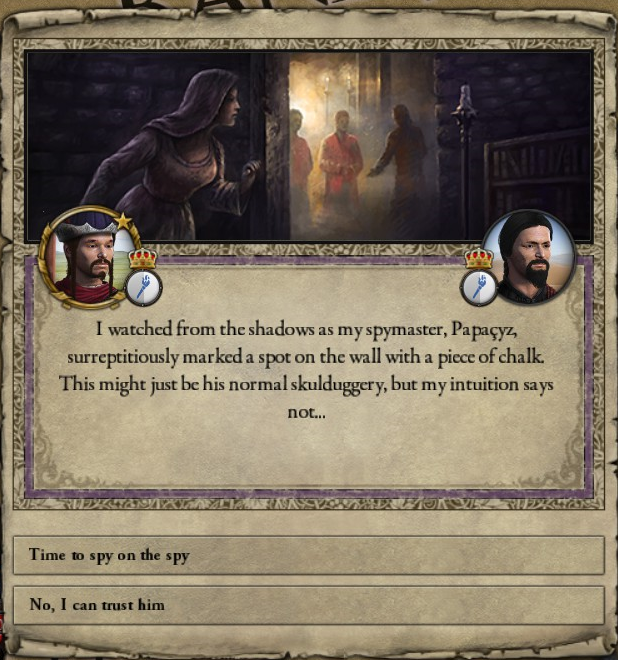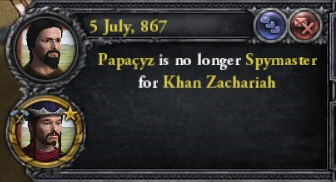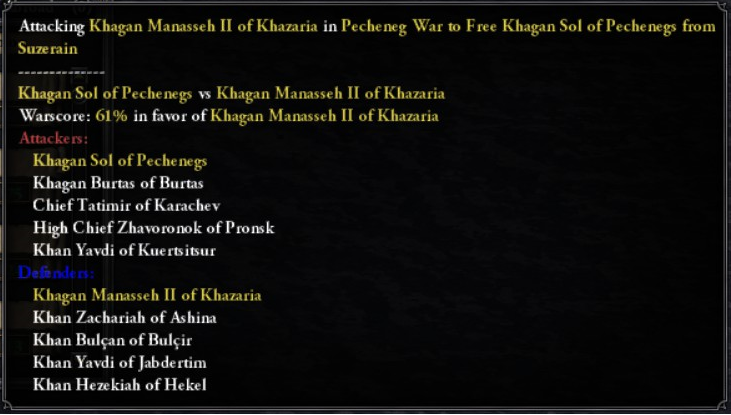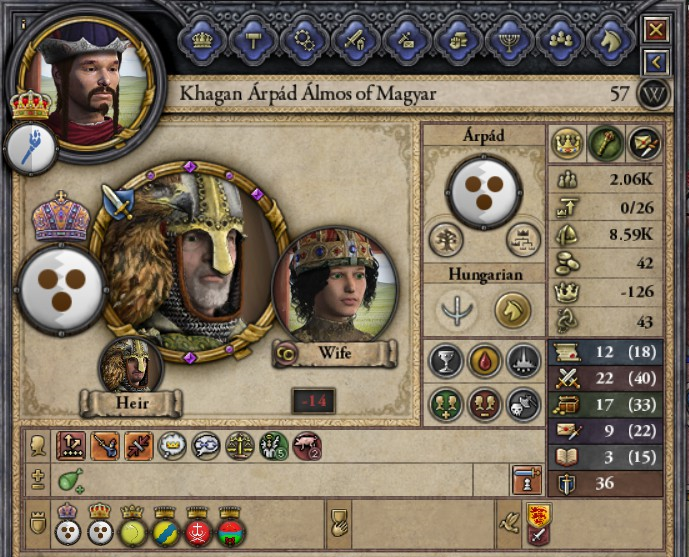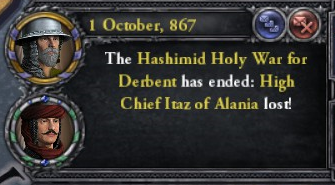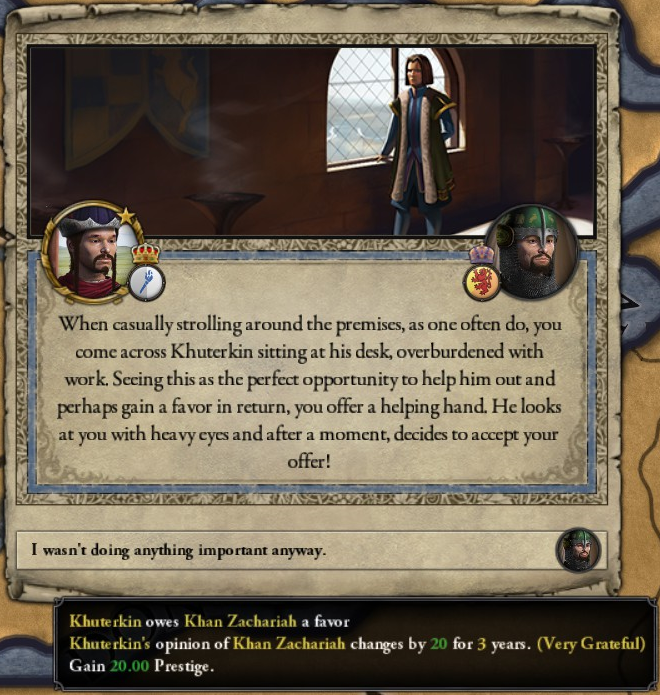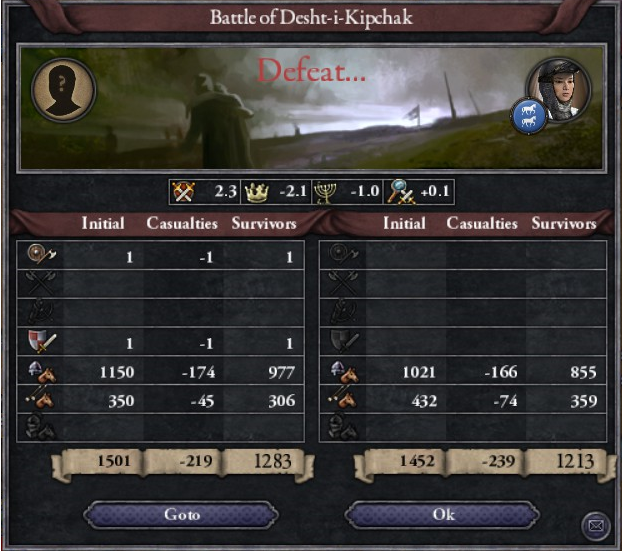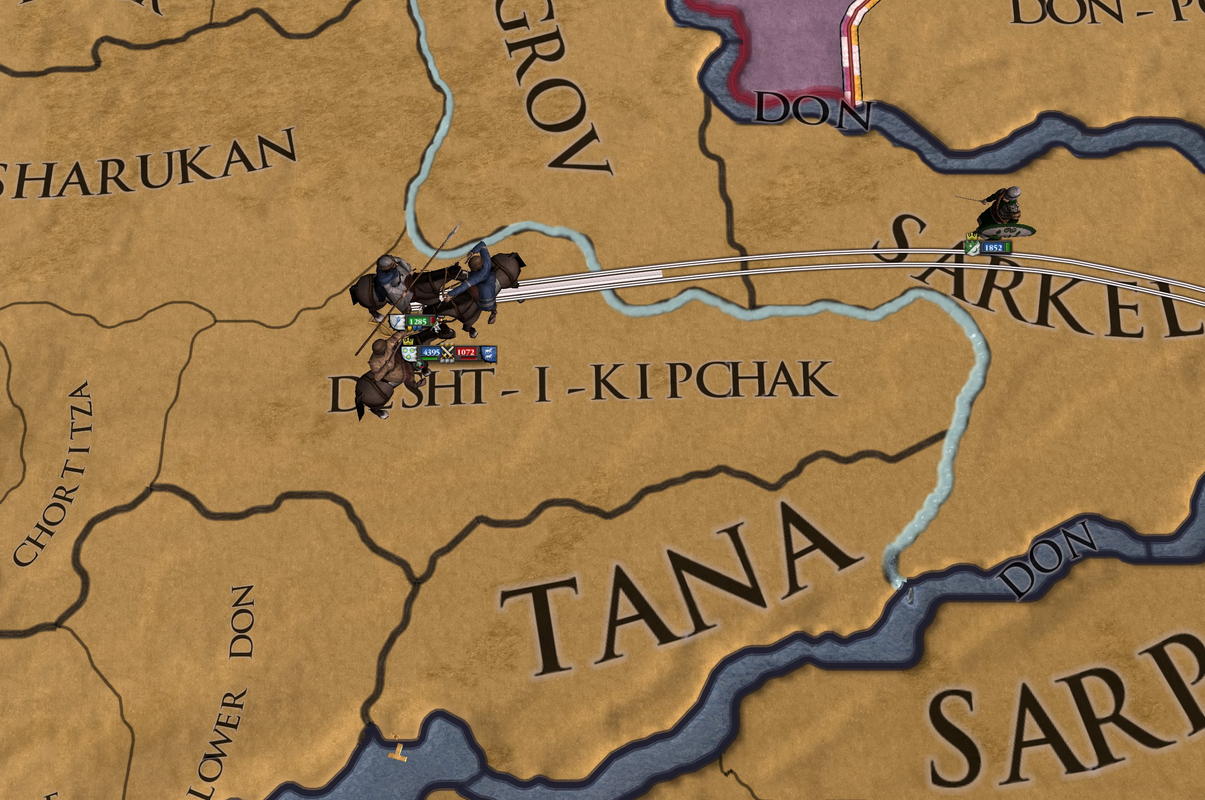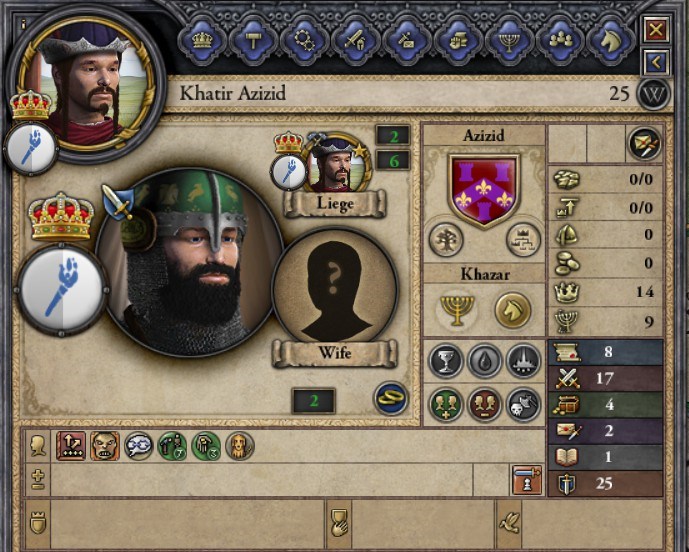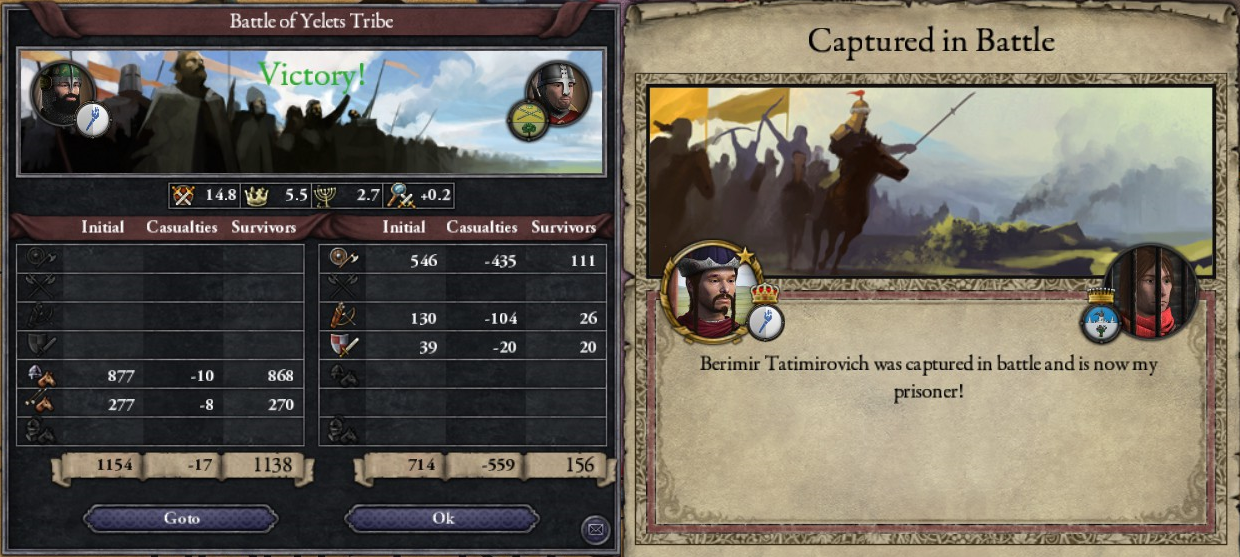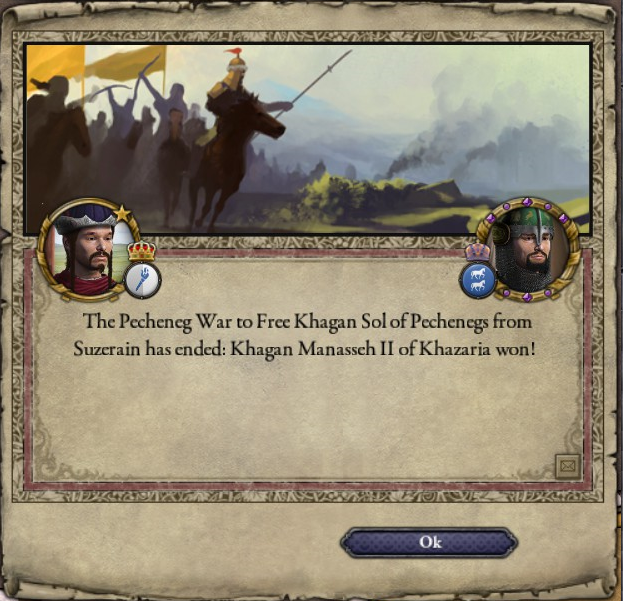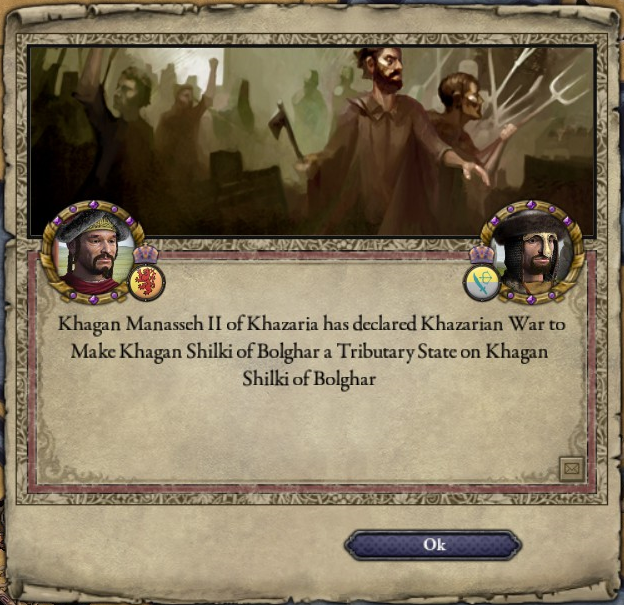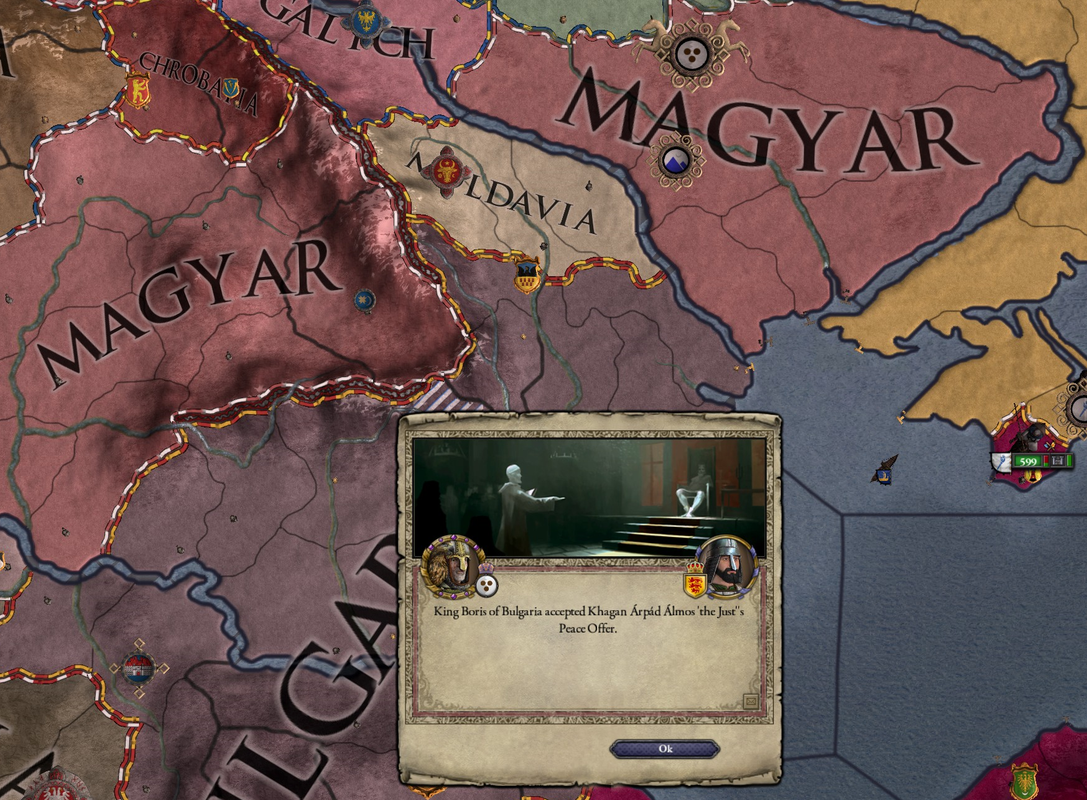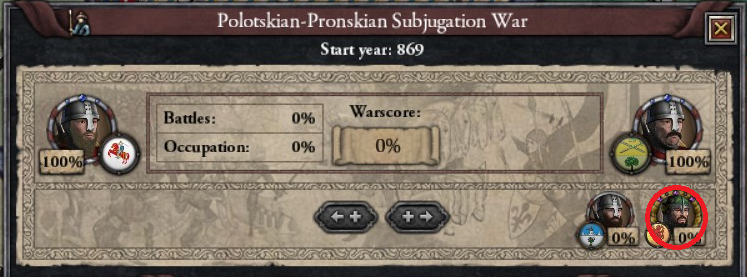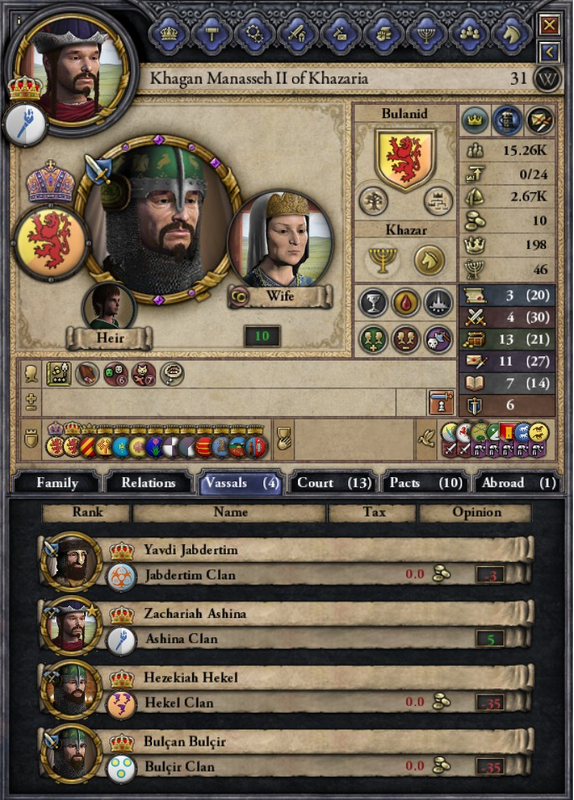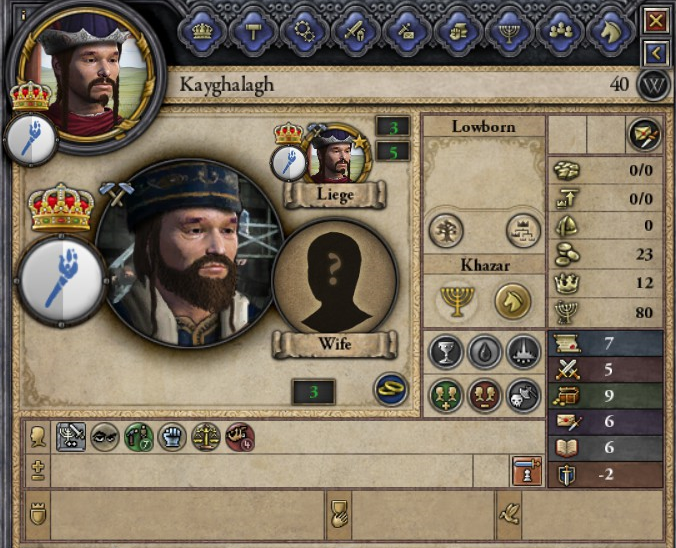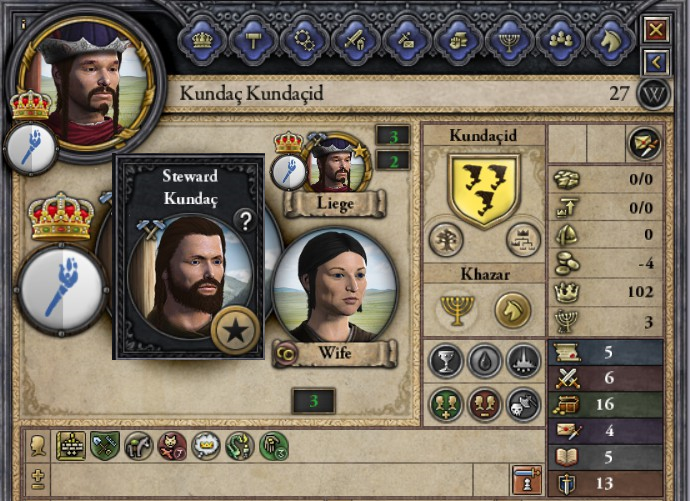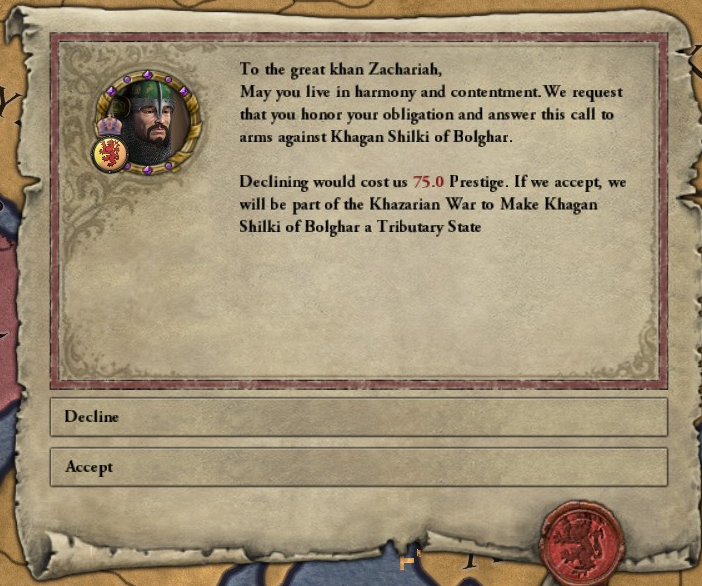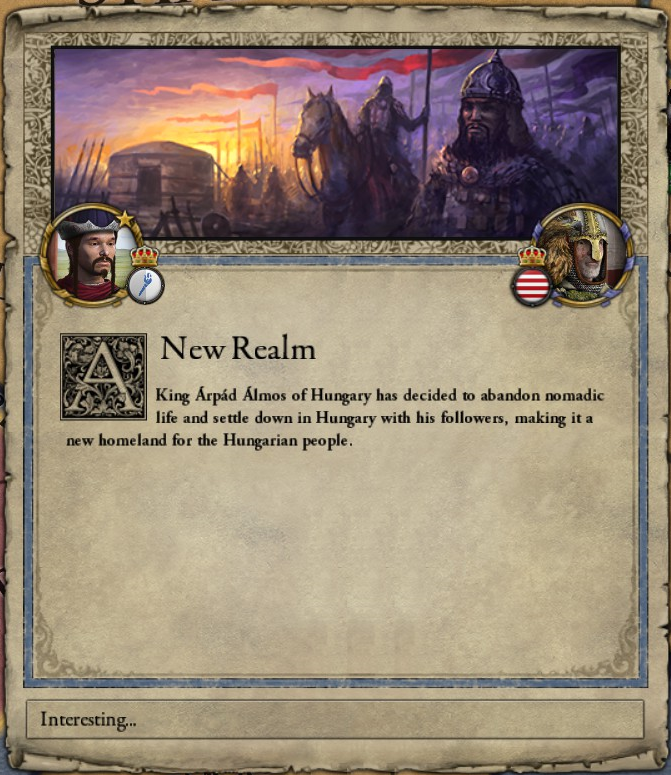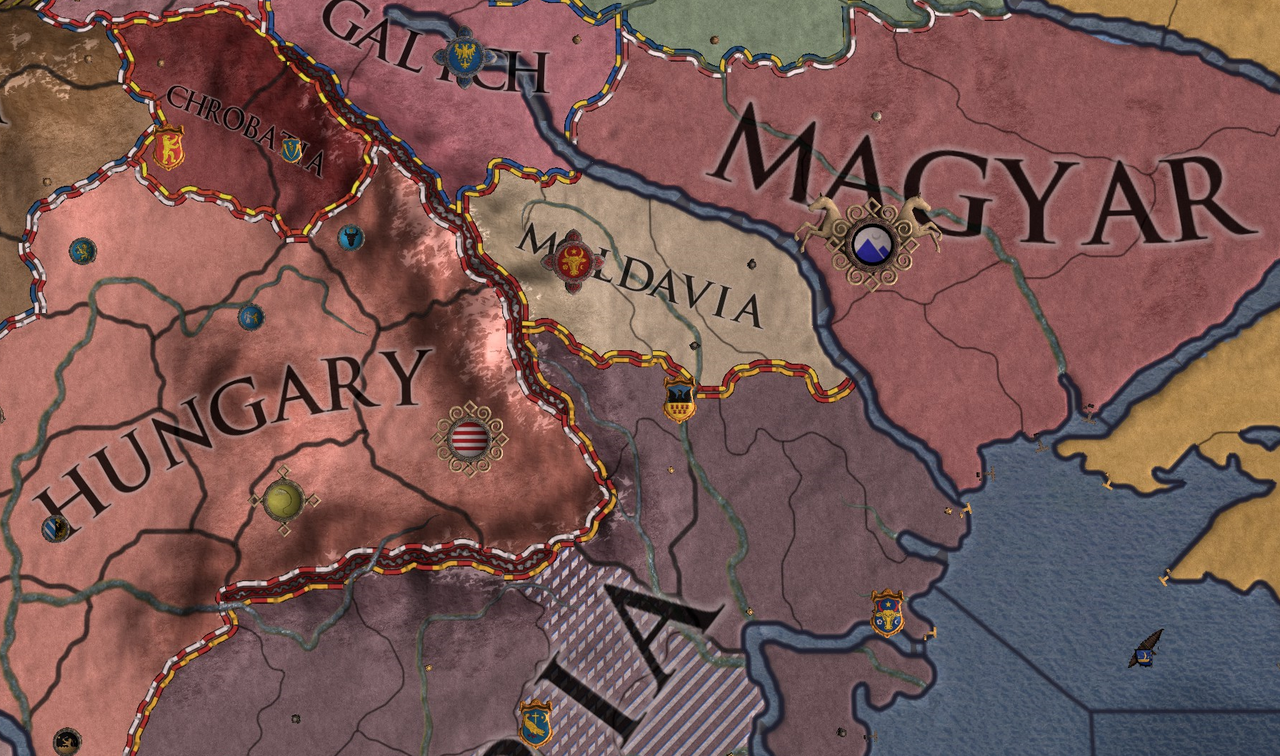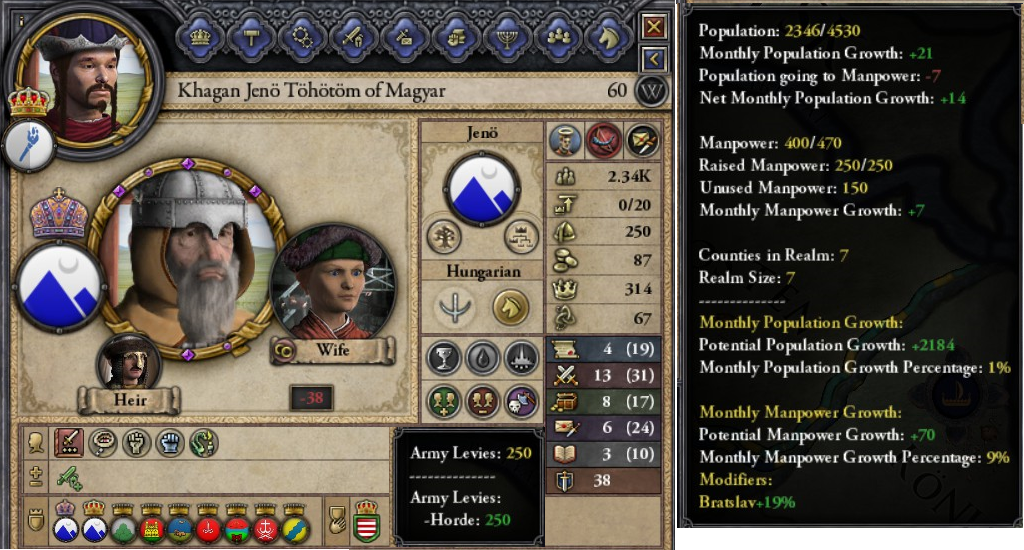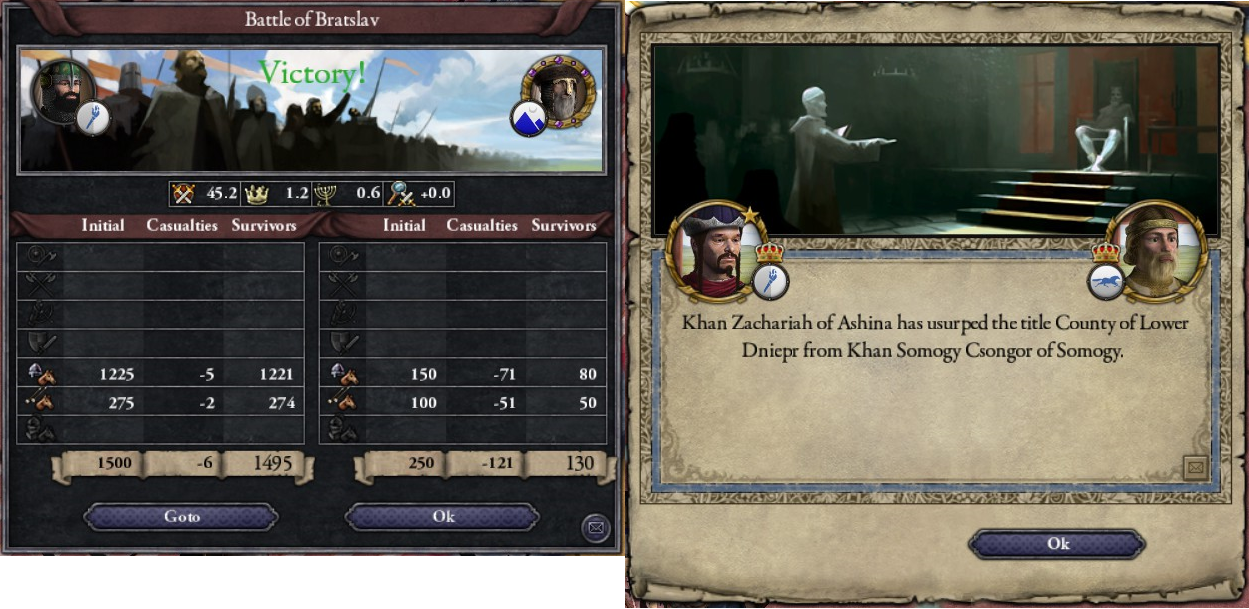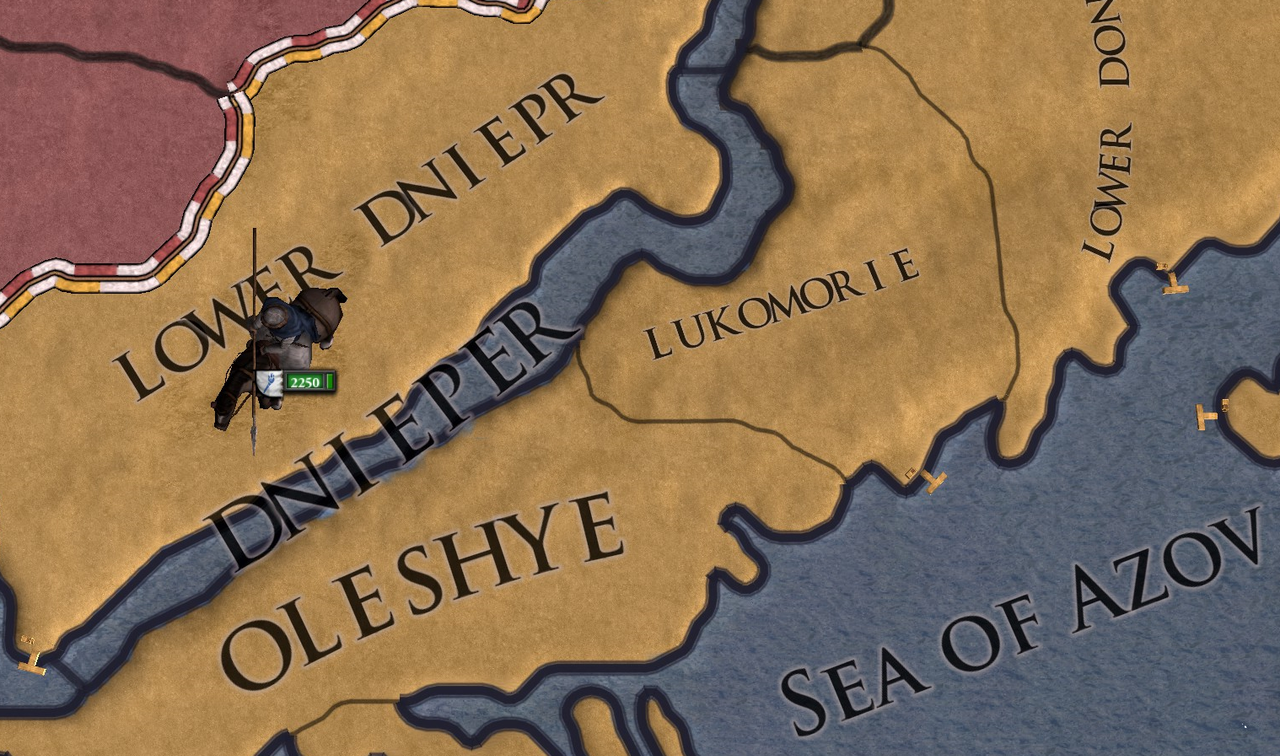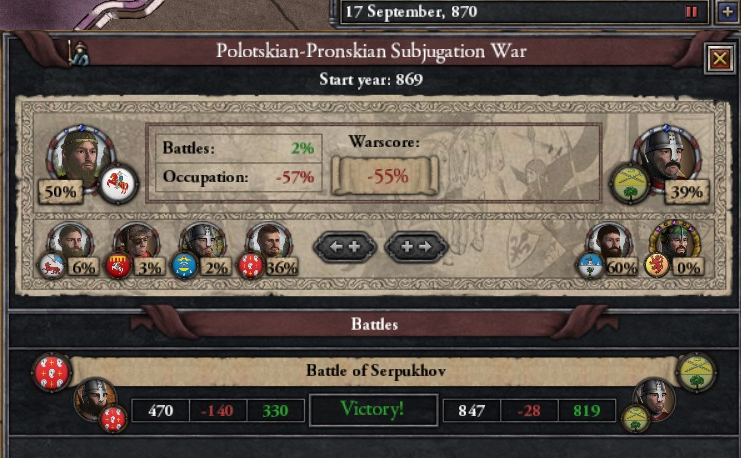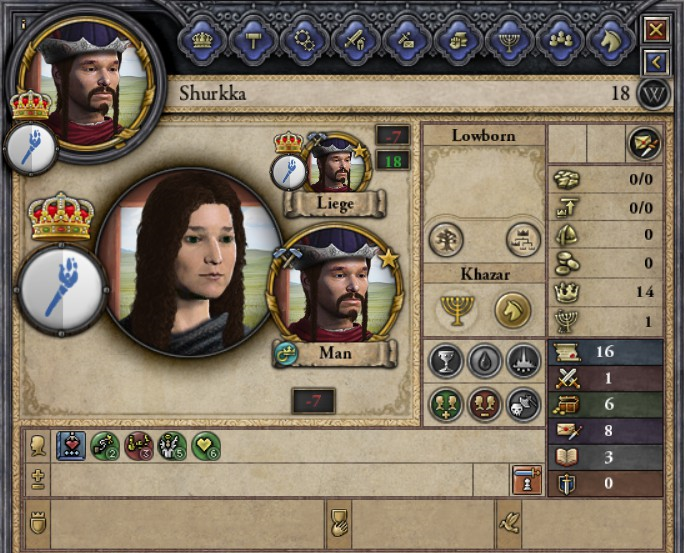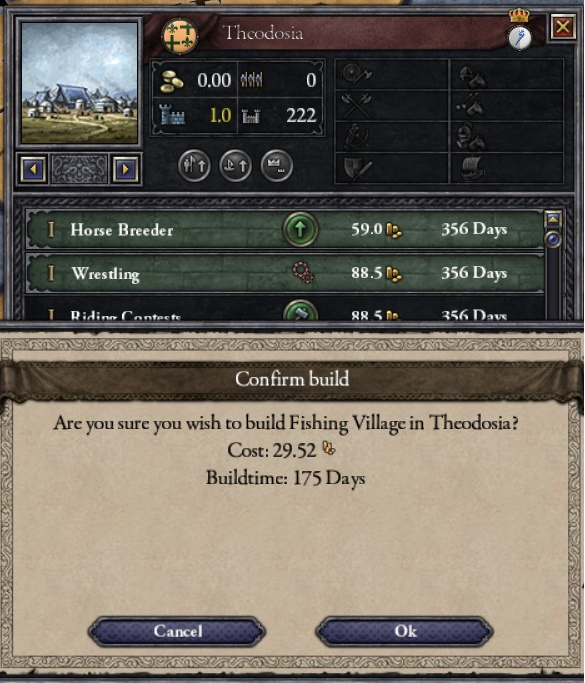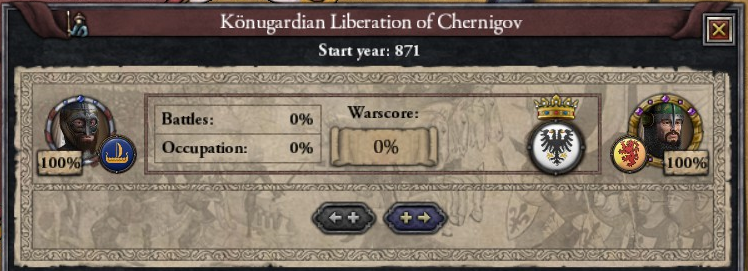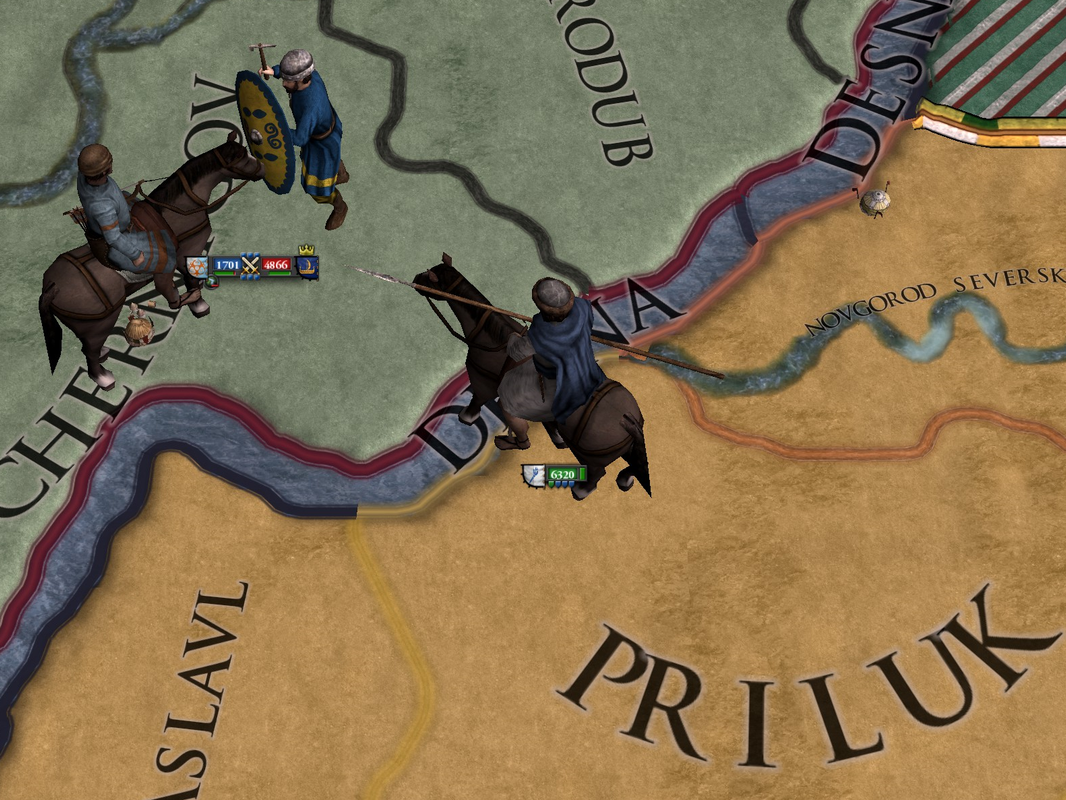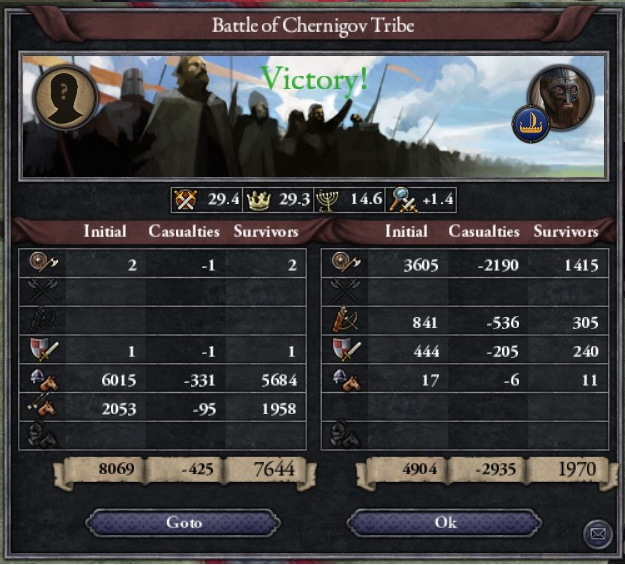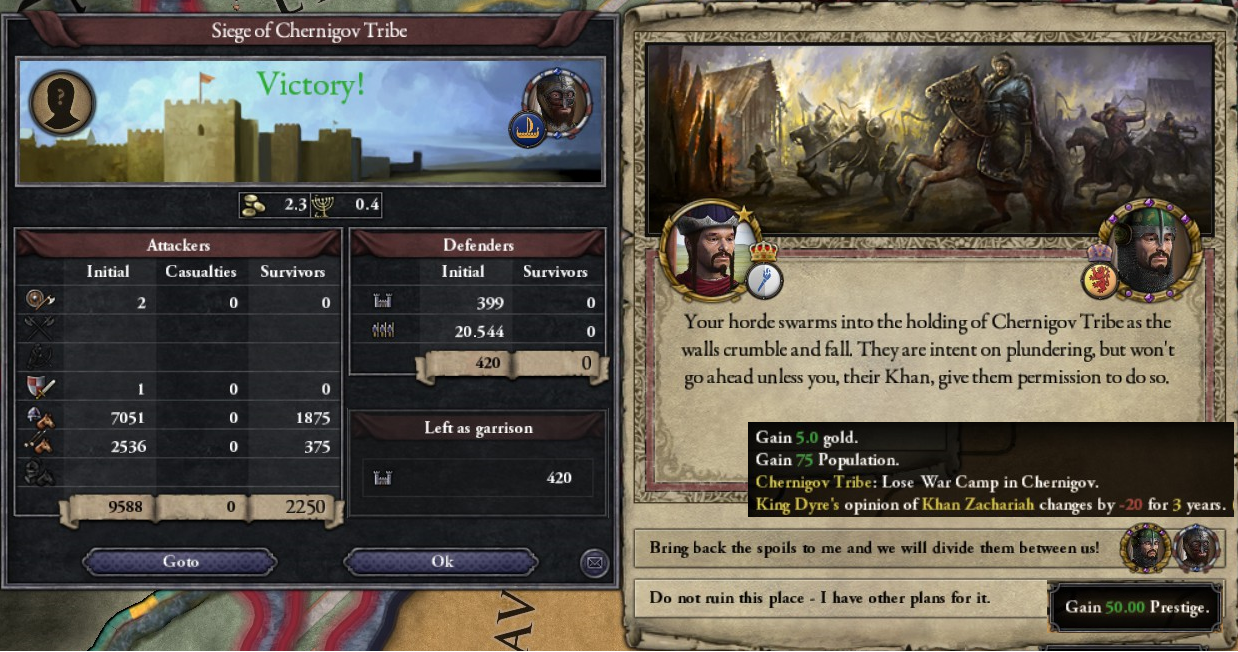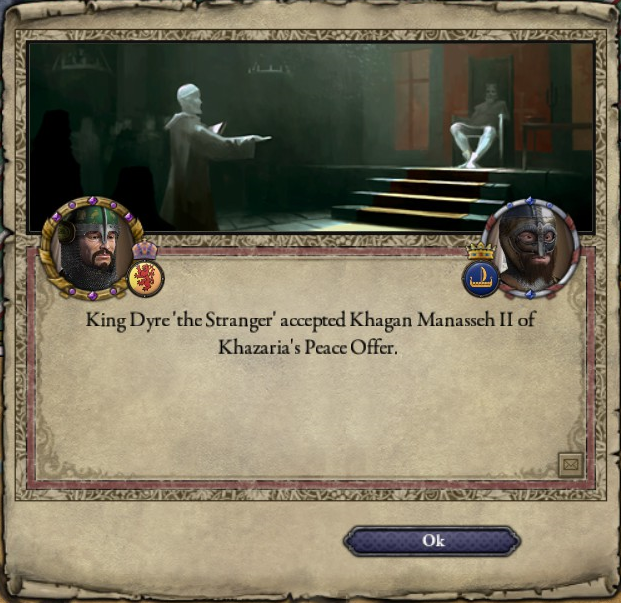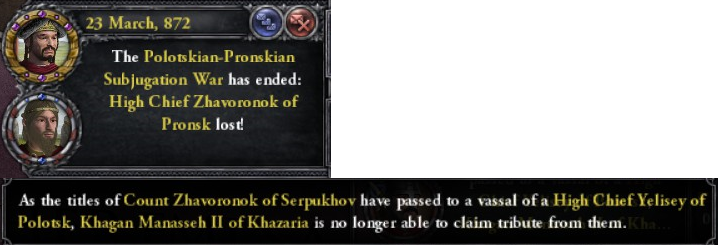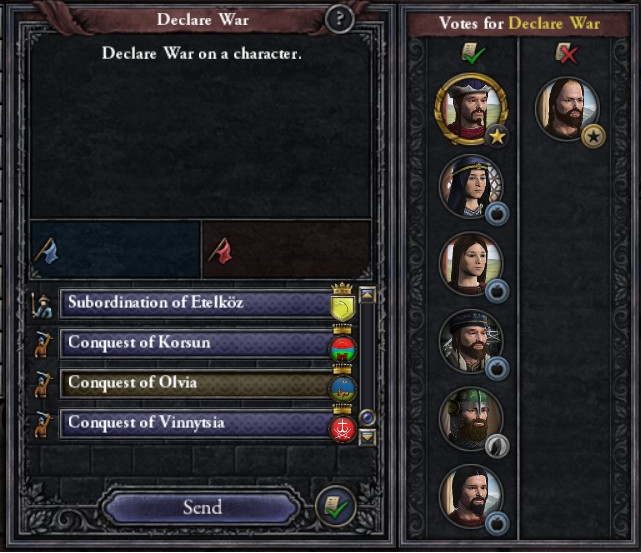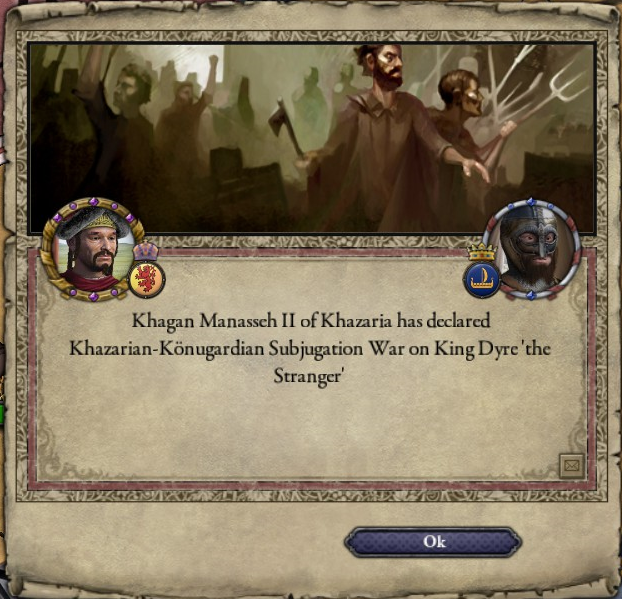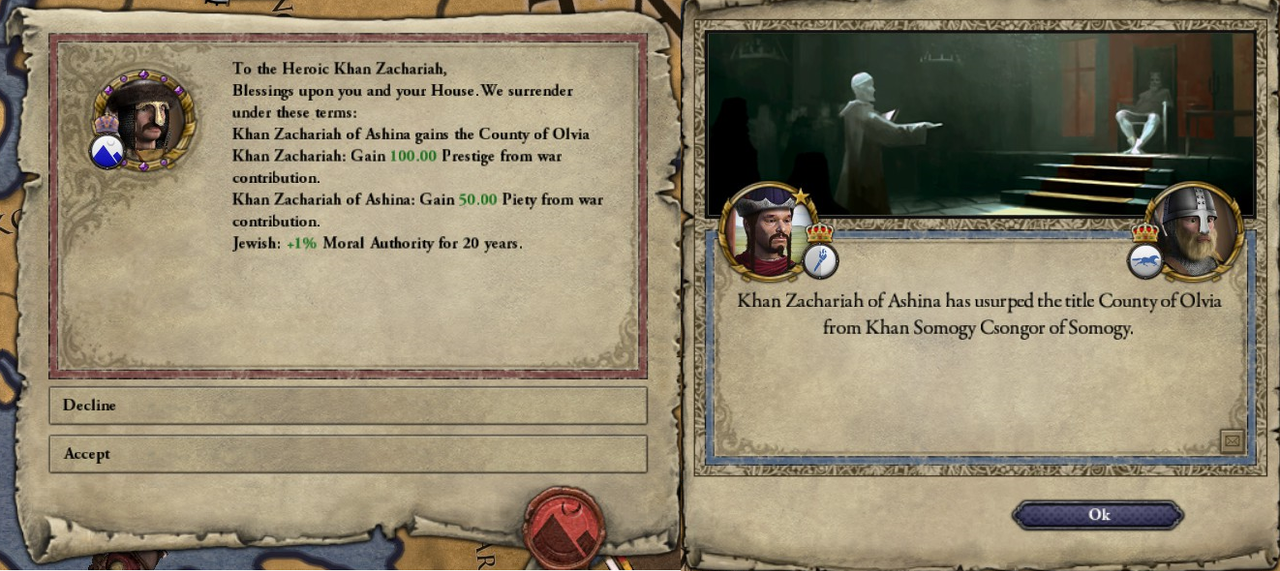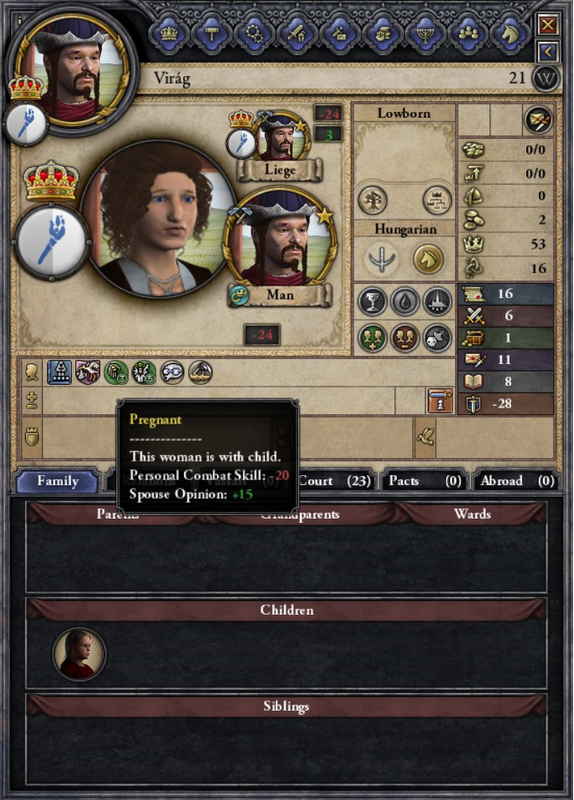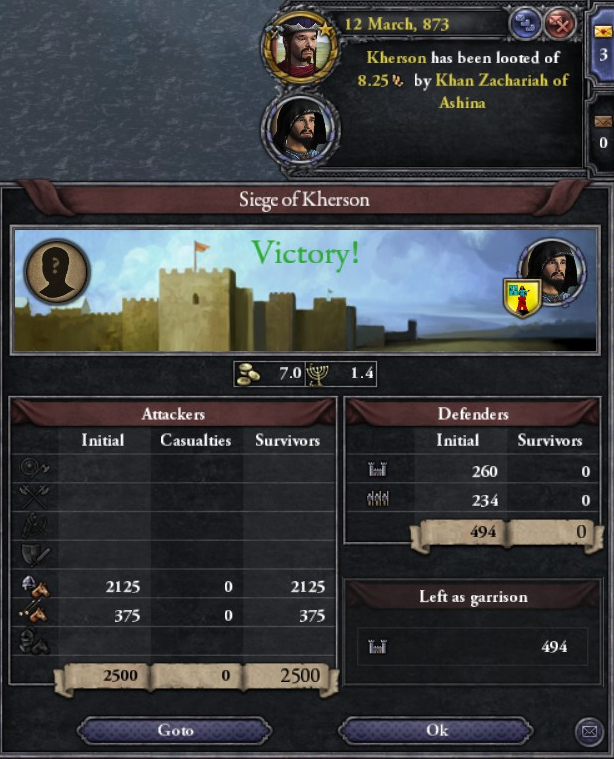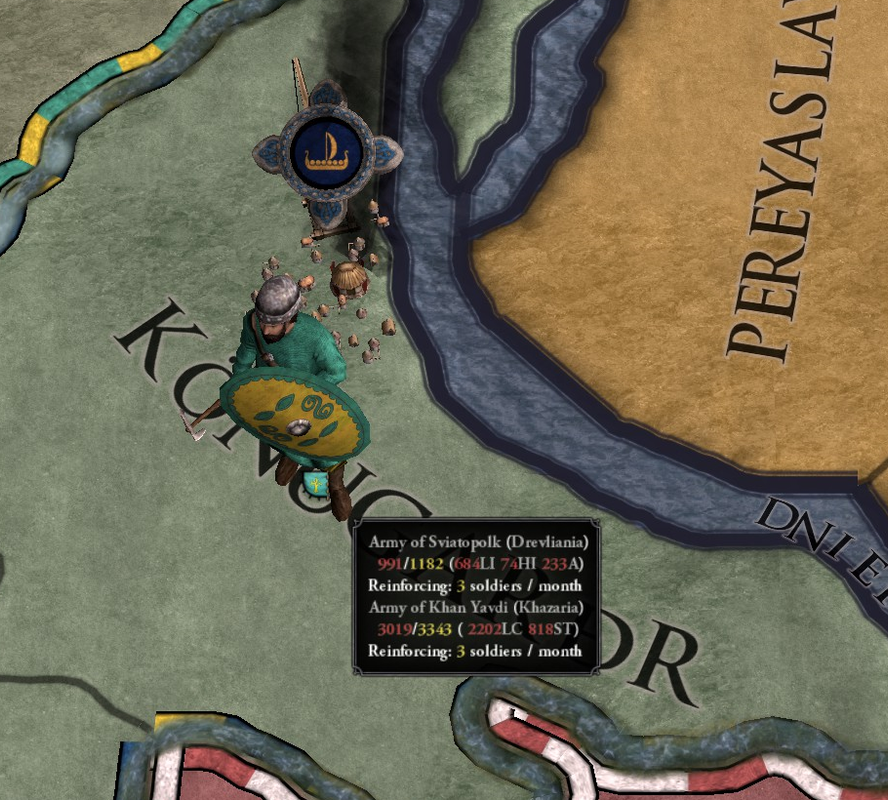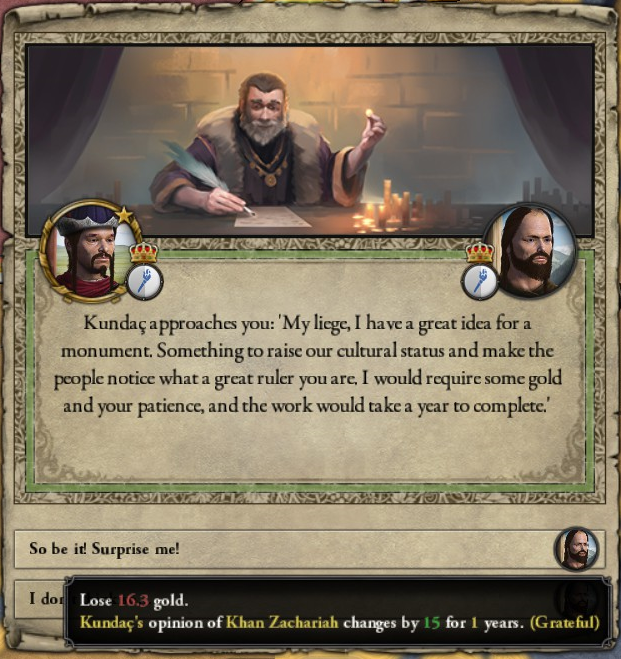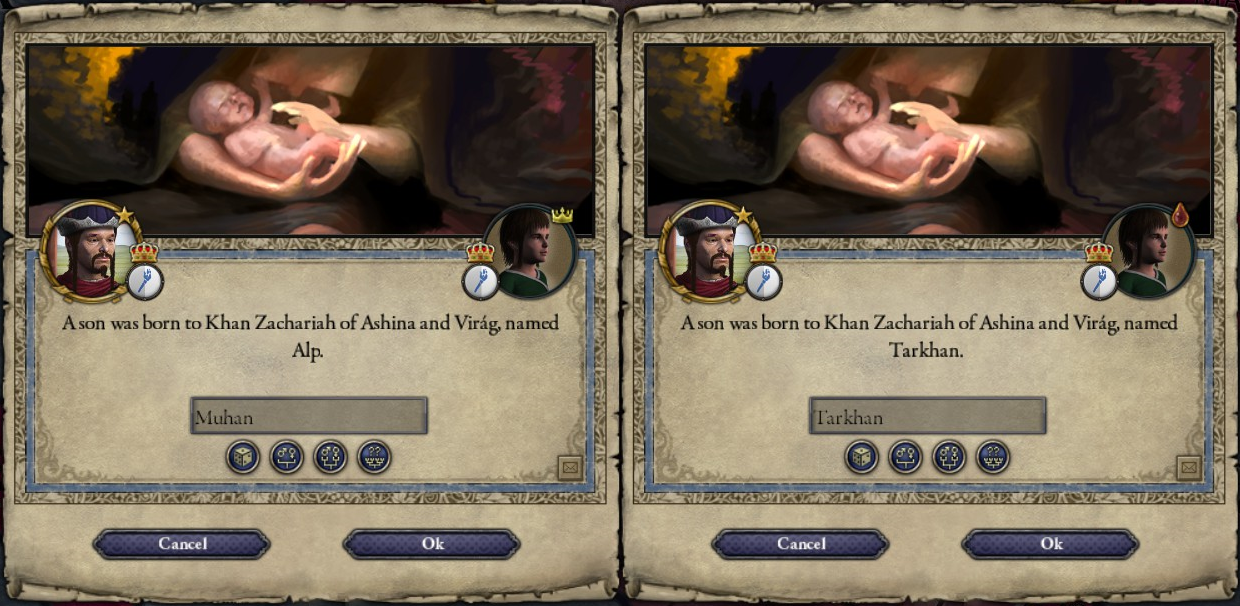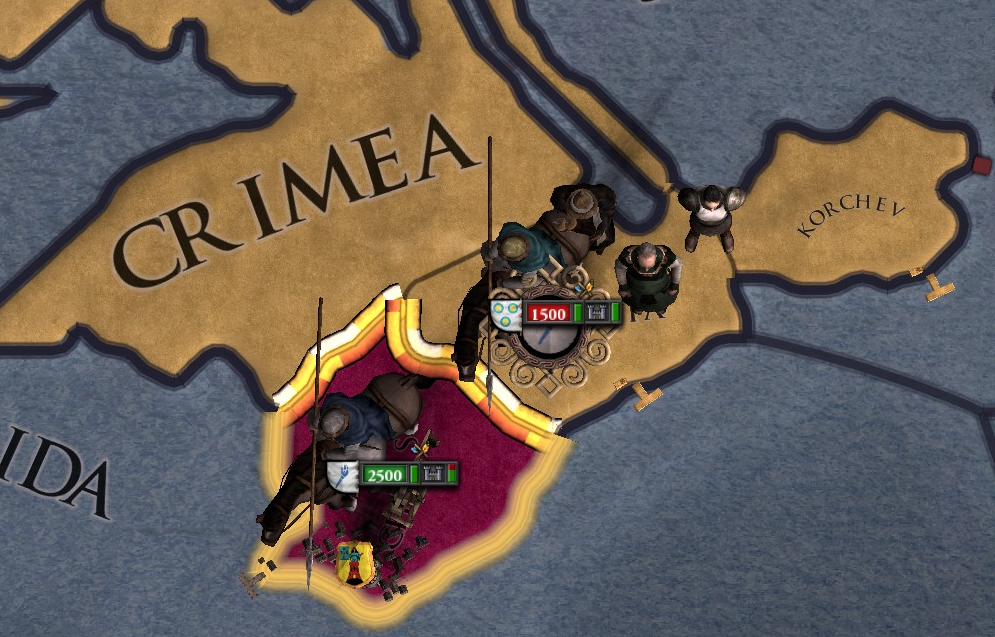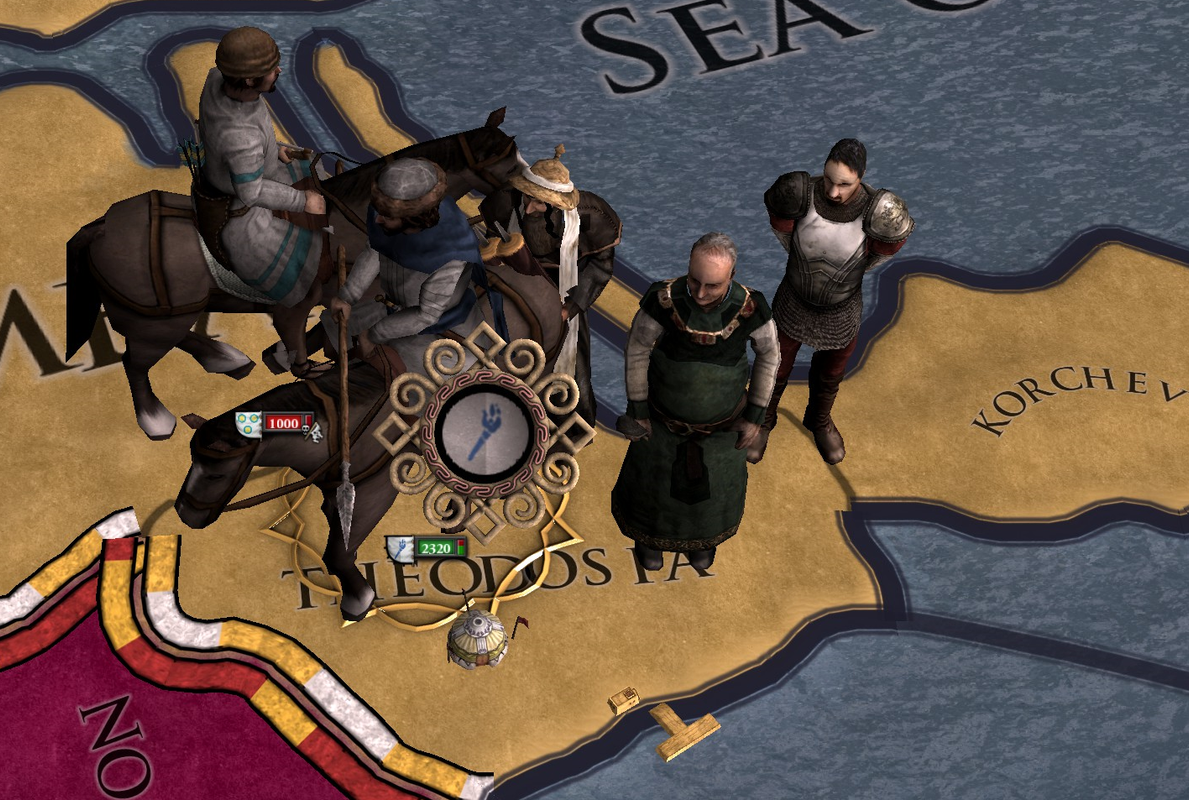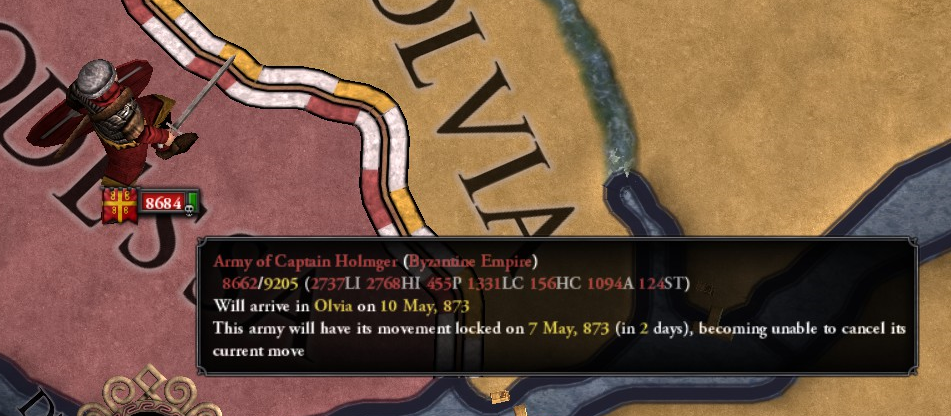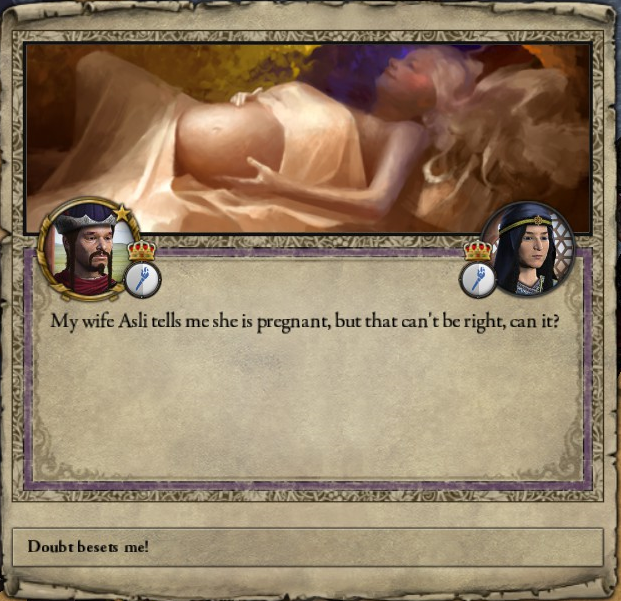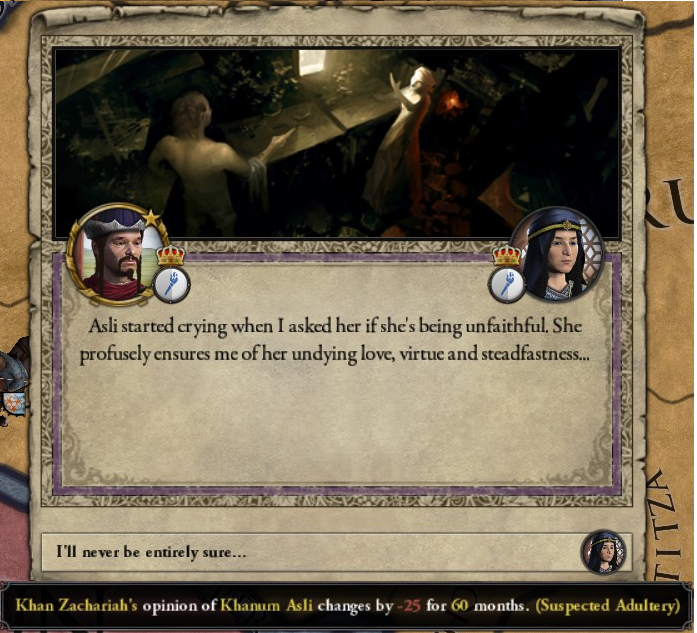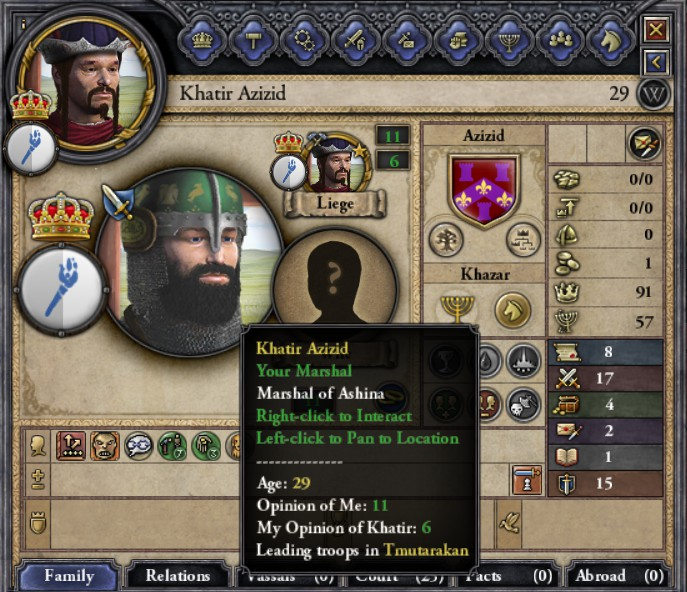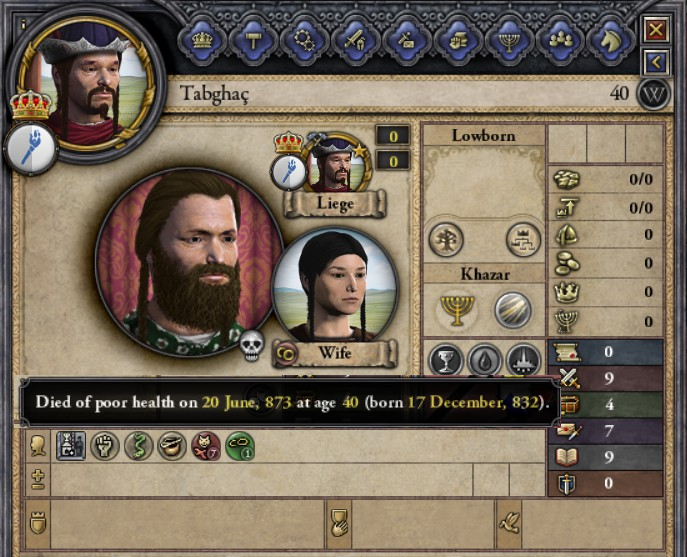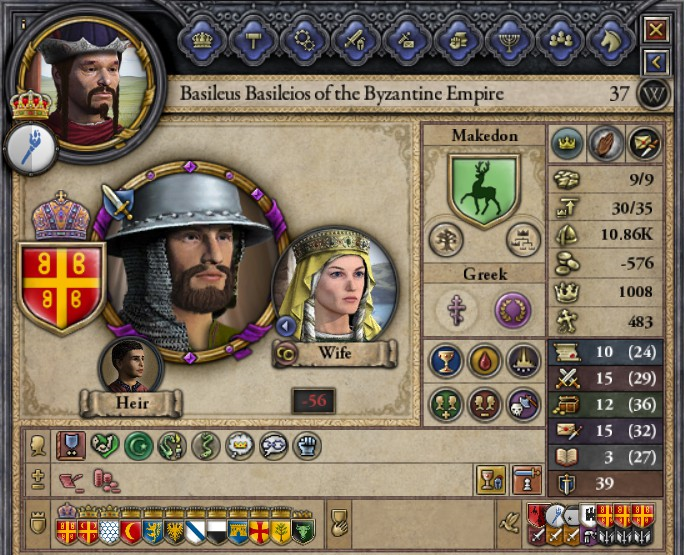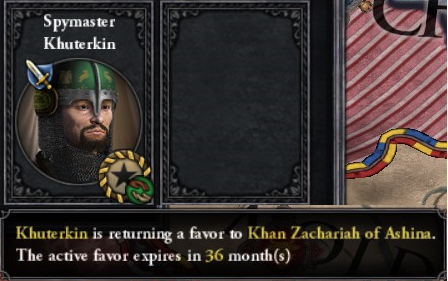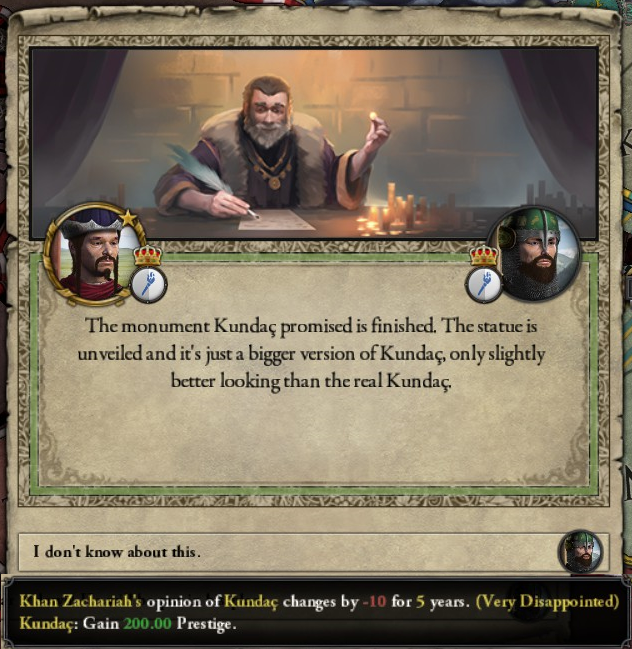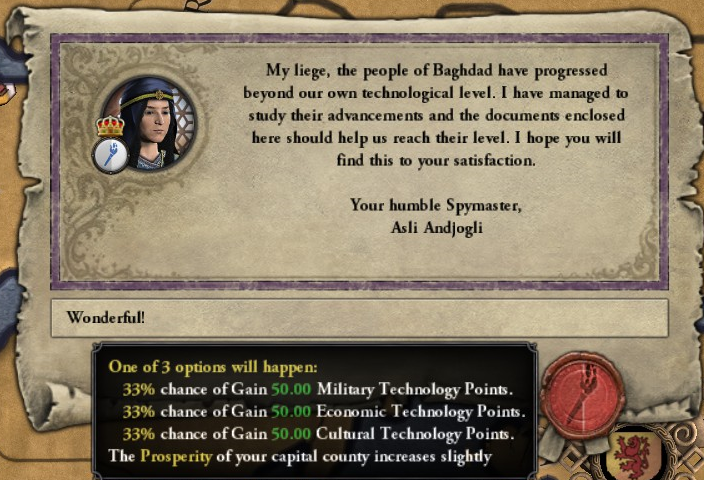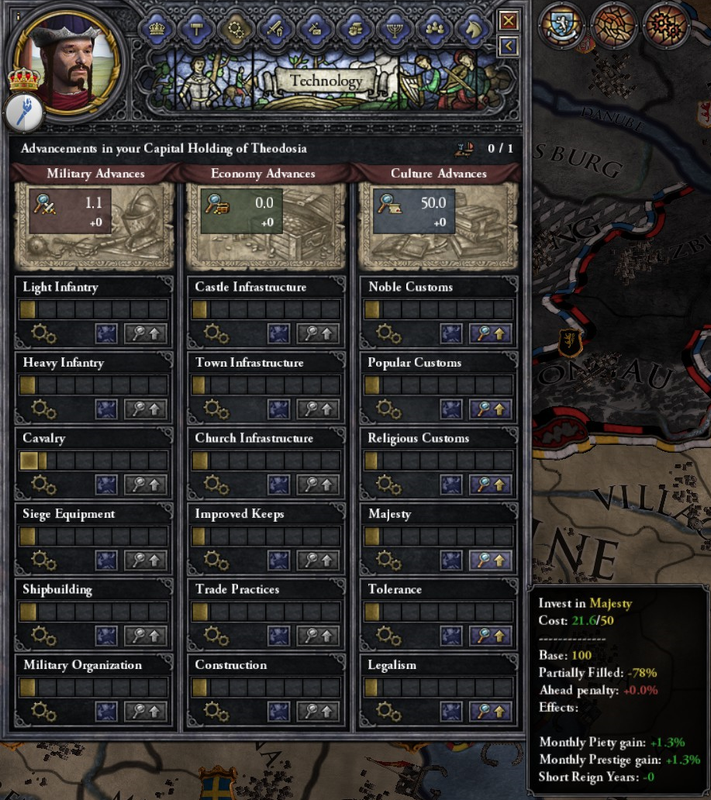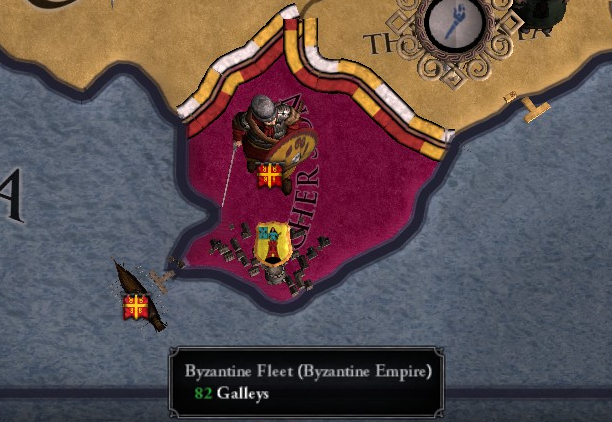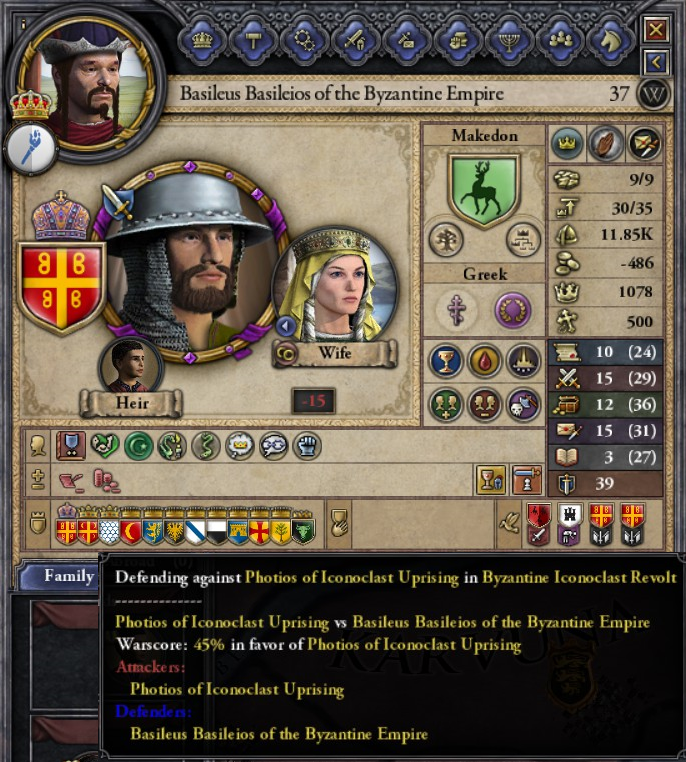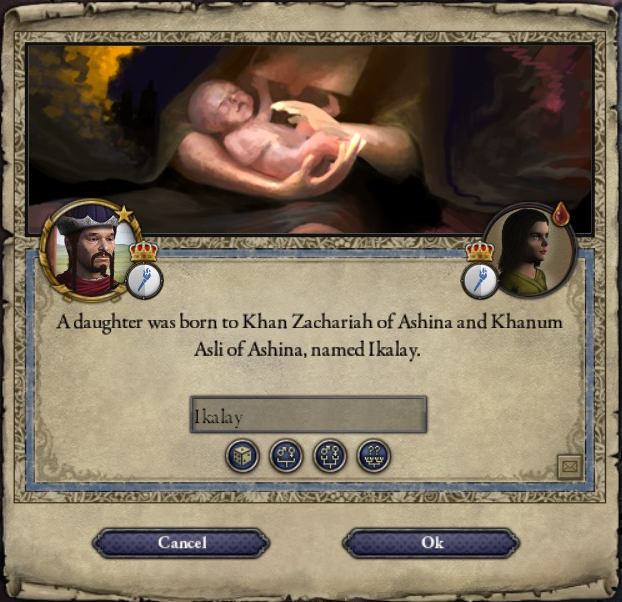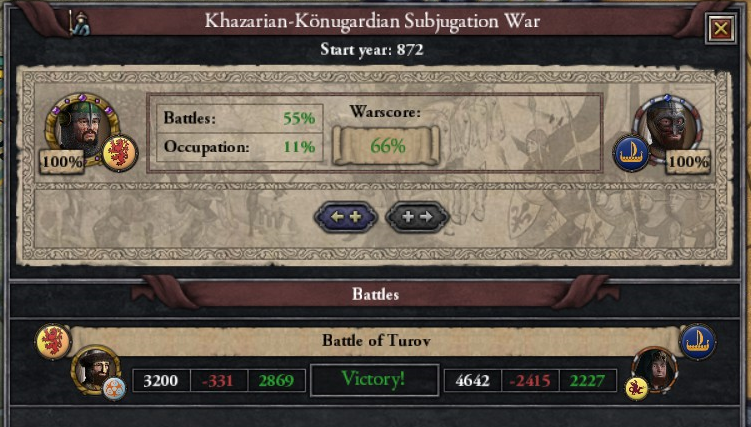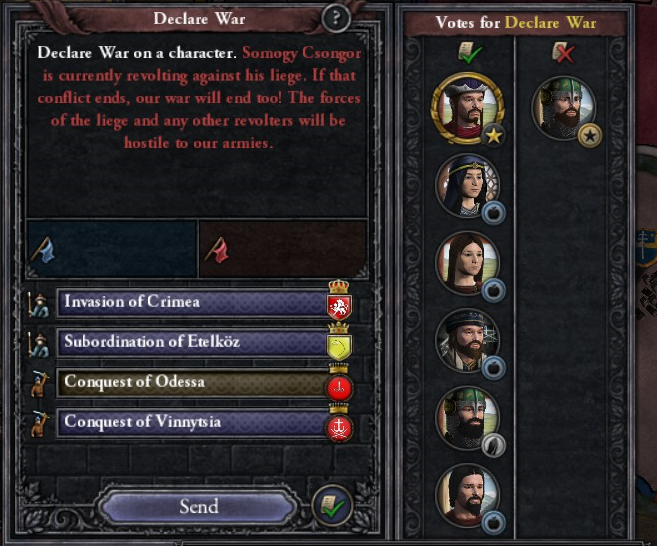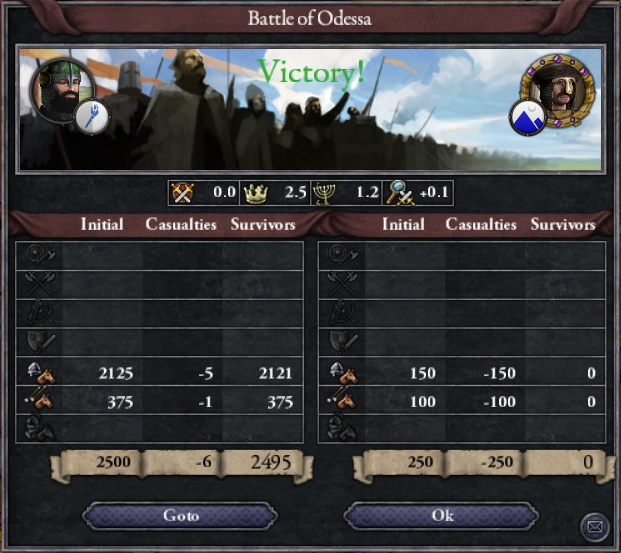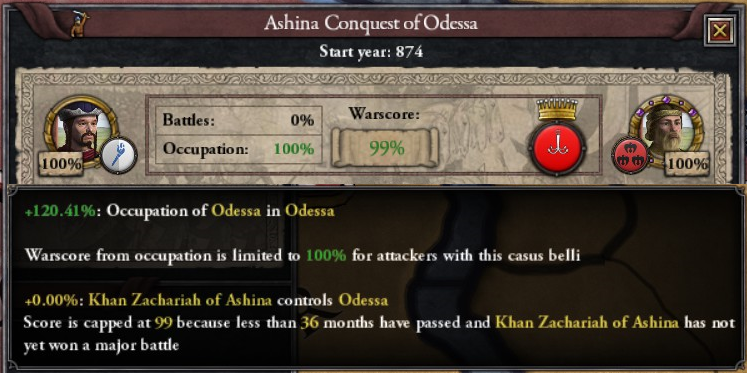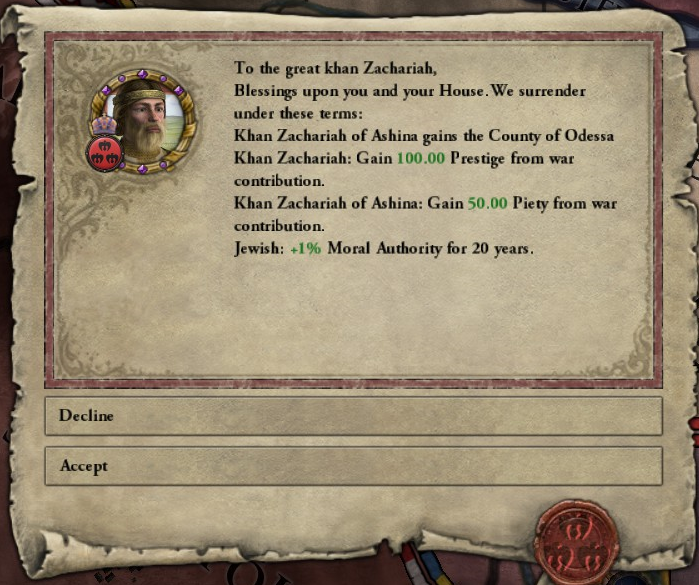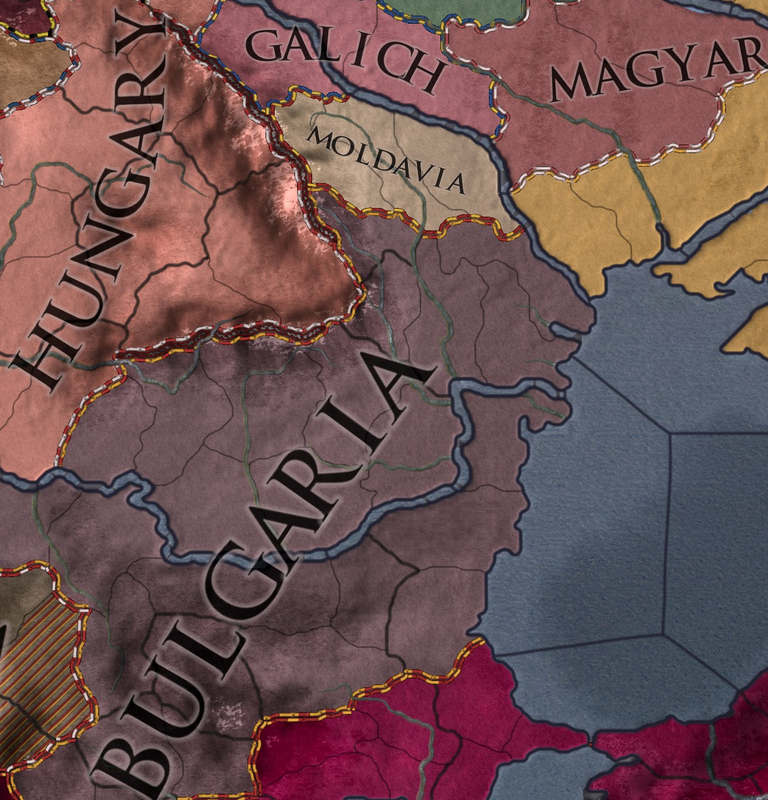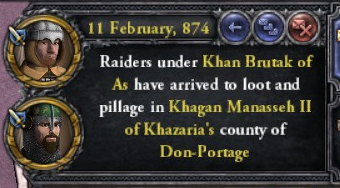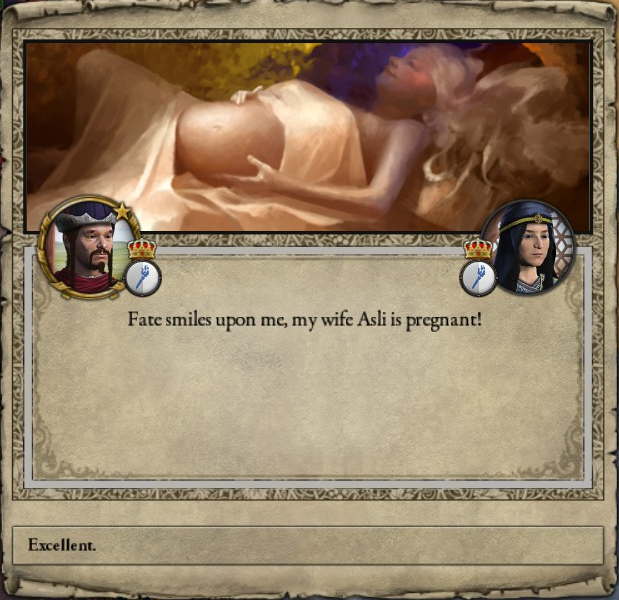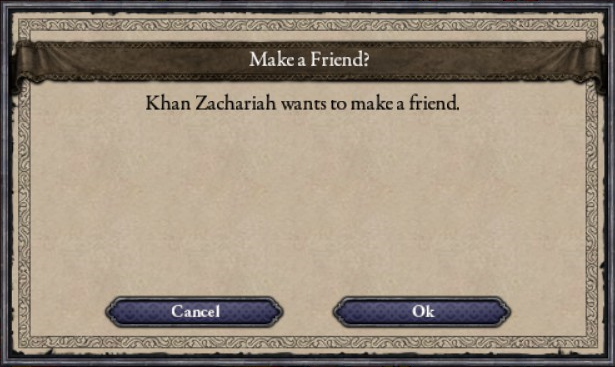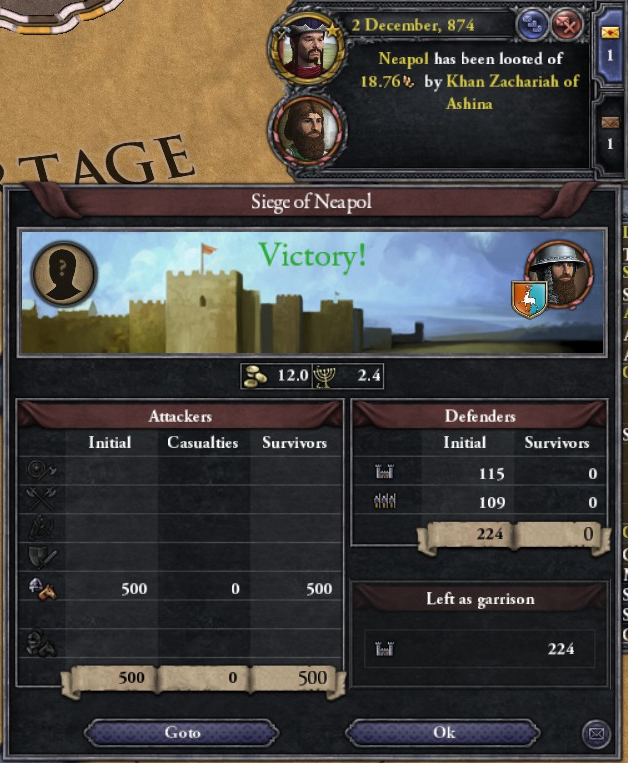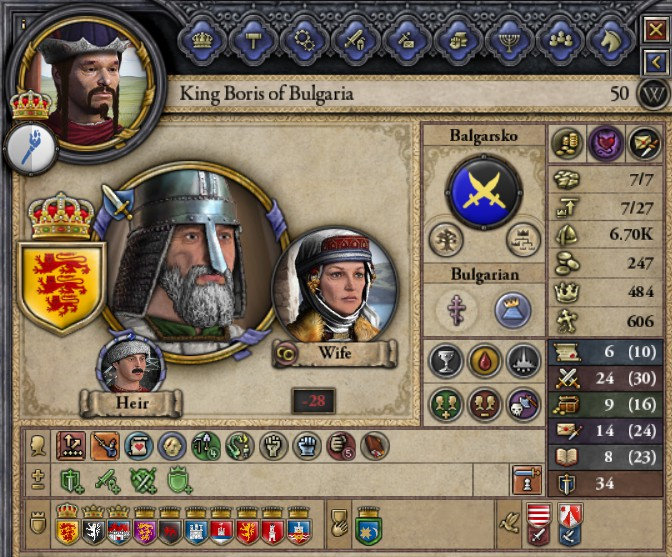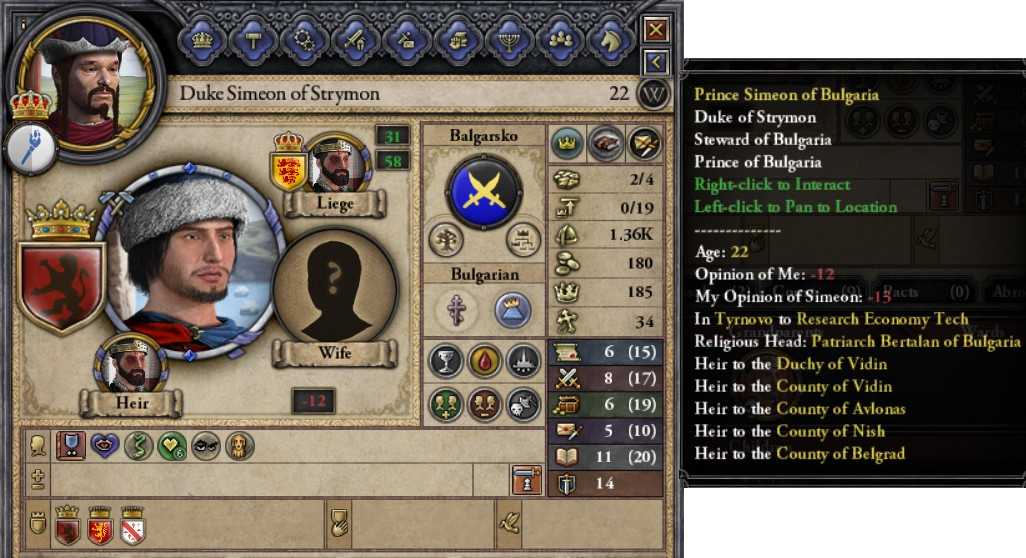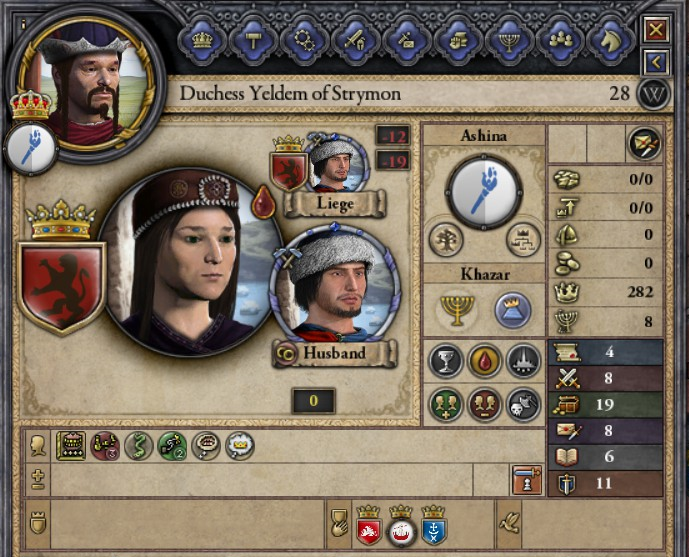Hello everyone, and welcome to my first attempt at an AAR!
This is the story of the once great Ashina clan that's been reduced close to extinction and struggles to find its place in a perpetually shifting environment. They're also the historical founders - but no longer the rulers - of what in 867, when our story starts, is the only Jewish realm in the world to speak of, namely the Khaganate of Khazaria.
Basic Guidelines:
Prologue - The Ashina Clan
December 23, 866 AD
It was a cool and cloudy day in Theodosia, and a sharp wind blew from the seaside. Two black-bearded men were standing on a ledge, quietly beholding the simple settlement of Yurts and makeshift accomodations on the verge of a seemingly endless plain stretching to the horizon. Both sons of lowly descent, through diligence and loyalty they had made it to the most trusted councillors of Tarkhan, Khan of the Ashina Clan, ruler over the lands around the Sea of Azov and the only legitimate successor to the legendary Khan Muhan Ashina (at least as far as his tribesmen were concerned).

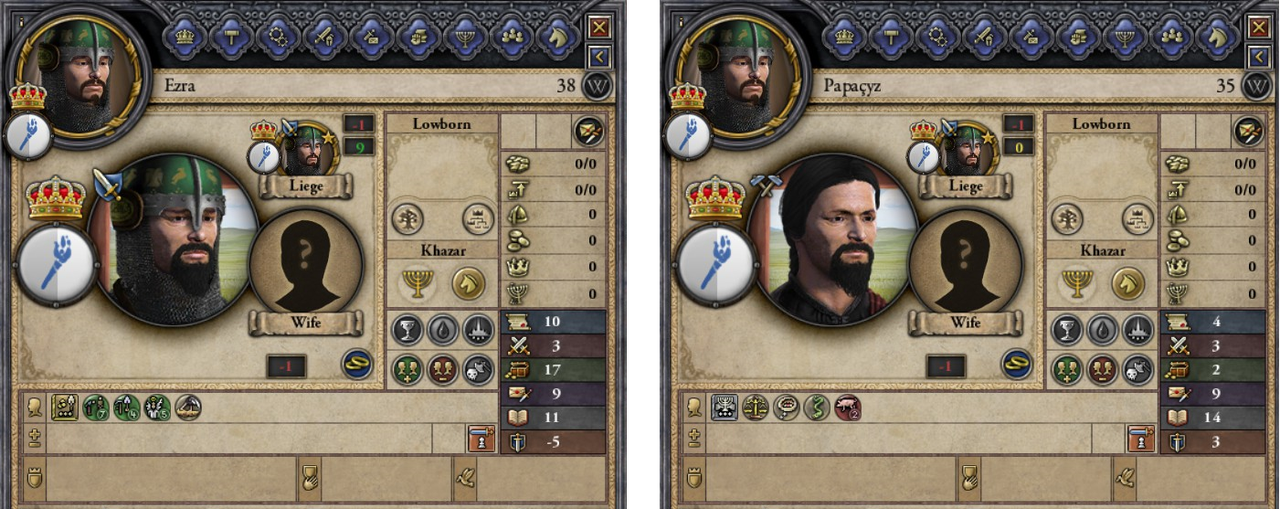
Papaçyz, Spymaster of Ashina and the younger of the two men, broke the prolonged silence.
"I've made arrangements to keep the tribal council's ruling secret among the population – at least until it comes into full effect upon the Khan's demise. How did Zachariah take the news?"
Ezra, Chancellor of the Ashina realm, gave him a grim look.
"He stormed off cursing and refused to talk to anybody for hours. Our delegation got delayed so much it was almost nighttime when we arrived back in Theodosia. A little later, and we would have been little more than free booty to even the lowliest heap of steppe raiders.
And this is the man who's supposed to be Khan in a few days. As if it's not enough that we're losing a whole chunk of our lands for good and aren't able in the slightest to do anything about it."
The aging Khan had not taken the new circumstances after their relocation well. The local climate and diet were different from anything the tribe had been used to, and while most of his people were naturally adaptive, the Khan's health began to deteriorate rapidly upon arrival. Three weeks ago he had fallen ill so gravely that he was soon no longer fit to rule. He had been barely awake for the past days and rumors had started to circle he did not have much time left before his son Zachariah was to take over the Khanate.
When the Khagan got wind of this, he immediately made arrangements for a realm-wide council and in absence of Tarkhan declared his claim on the plains east of Crimea known as the Great Chiefdom of Azov. Tarkhan had left the lands in disgrace and Zachariah had absolutely nothing to show for himself that justified the return of those lands from the authority of the Khagan who had restored order where the Ashina had failed. It didn't help Zachariah's case that the other Khans held little regard for him or his father and had no reason to possibly anger the Khagan when his plans went to the Ashina's expense, not their own.
Thus it was ruled, against the vote of Ezra as the official Ashina representative, that technically Tarkhan was not stripped of the land (that would have violated Khazarian laws), yet Azov would not be part of Zachariah's inheritance upon Tarkhan's demise, but fall to the Khagan instead.
Papaçyz sighed.
"Hard times are ahead. Zachariah isn't remotely fit to the task, and everyone who would even come close lacks royal blood. Looking out for this fool is not going to be a pleasure."
"Not in the slightest. And there are all kinds of rumours – apart from the usual threats to Khazaria from the hordes in the north and east, the Magyars in the west are raising a sizeable army, some adventurous Norsemen are settling in their vicinity and the tributaries of Khagan Manasseh are always on the brink of revolt. We'd better be prepared for the succession. I wouldn't count on Zachariah giving the best example of sensible leadership anytime soon."
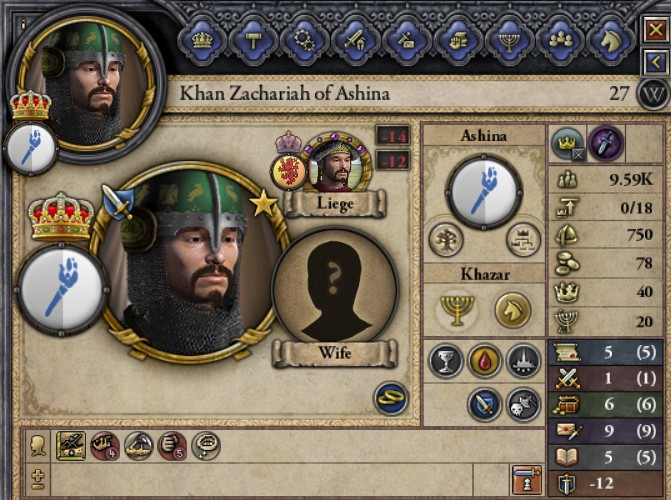
On the brink of what the Christians far in the West considered the first day of a new year, Tarkhan, Khan of the Ashina Clan, took his last breath. His only son Zachariah would soon rule over the lands between the Don and Dnieper estuaries and the Strait of Korchev. The Ashina, once one of the greatest Clans in the steppes, looked out on an uncertain future.
This is the story of the once great Ashina clan that's been reduced close to extinction and struggles to find its place in a perpetually shifting environment. They're also the historical founders - but no longer the rulers - of what in 867, when our story starts, is the only Jewish realm in the world to speak of, namely the Khaganate of Khazaria.
Basic Guidelines:
- Playing out the characters and the narrative goes before winning the game (though a certain sense of self-preservation is always assumed). I'm not set for any particular in-game goals despite the title. It all depends on who leads the realm and where alternate history takes us. That also makes for a rather slow in-game pace - after I started writing, it took me two evenings to just unpause. It doesn't go on exactly like that, but it's safe to assume that fast progress is not to be expected (or attempted) anytime soon.
- It's alternate history from the first letter on. I'm neither an expert on the true history of the Khazarians nor on nomadic lifestyle in the Middle Ages or Jewish liturgy at the time. According descriptions will often be hilariously implausible to more educated people - that's because they're likely made up.
- All DLCs except Rajas of India, Monks & Mystics and the beloved Sunset Expansion are enabled. I'm also new to most of them (and not terribly experienced at CKII in total), so that makes for quite the realistic impersonation of a young ruler slowly growing into his responsibilities.
Prologue - The Ashina Clan
December 23, 866 AD
It was a cool and cloudy day in Theodosia, and a sharp wind blew from the seaside. Two black-bearded men were standing on a ledge, quietly beholding the simple settlement of Yurts and makeshift accomodations on the verge of a seemingly endless plain stretching to the horizon. Both sons of lowly descent, through diligence and loyalty they had made it to the most trusted councillors of Tarkhan, Khan of the Ashina Clan, ruler over the lands around the Sea of Azov and the only legitimate successor to the legendary Khan Muhan Ashina (at least as far as his tribesmen were concerned).

Muhan had lead his people to freedom over the oppressive Rouran Khaganate three centuries ago; he and his close followers took up banners and constituted the first generation of the Ashina clan. His great-grandson Irbis eventually founded the realm that was known as Khazaria by the time our story starts. A century of peace and prosperity followed (again, according to Ashina lore – historical evidence is hard to come by in the rough circumstances of the Steppes), the Khazarians reached the Black Sea and bonds were made with the local populace in the coastal settlements.
Muhan had become the stuff of legends in the meantime; some Jewish traders had brought books with themselves containing the ancient tales of their faith and soon rumors circled Muhan was a descendant of the lost Israelite tribes the Jews' Holy Book mentioned. Soon, many of the tribesmen were considering themselves the rightful successors of these mystic forsaken people and conversions to Judaism were more and more prevalent. When the higher ranks of the Khaganate recognized this, many of them followed suit – some out of genuine conviction, some because they figured it would be a convenient way to secure their power.
Baghathur Ashina, the Khagan of Khazaria at the time, showed himself indifferent. He was a born soldier without the slightest knack for theological debate and in all honesty could not care less what his people were praying to in private. He refused to convert for all his life and kept riding with his men until earth and sky would finally take him back into their eternal embrace.
At the same time, his ambitious and far more erudite son Bulan made a name for himself at home, preaching the religion of their forefathers and defending the realm from several infidel (at least now they were considered so by most people) raiding groups. When Baghathur died, Bulan decided to open a new chapter for Khazaria – the Khagan would from now on be chosen exclusively from his newly founded Clan, further known as the Bulanids. The Ashina remained in power over the southern Khazarian lands, but were reduced to one among several Khanates under the Bulanid Khagan, who now proclaimed to be the true successor to Muhan and also the rightful protector of the Jewry all over the world.
The current Khagan was Manasseh II, a cunning man of brutish and arrogant manners, who had ruled Khazaria for the past three years and focused on extorting tribute from his smaller neighbours. Manasseh was no great warlord, but he secured his authority through a network of spies and favors that kept him in full knowledge of everything going on in the realm.
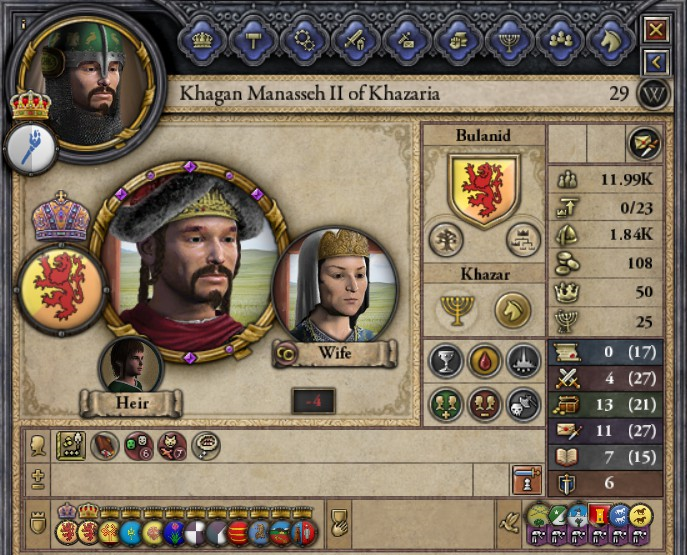
The Ashina had put up camp some time ago near the Crimean Mountains. The hilly terrain to the West and the Black Sea provided an amount of protection from weather and unruly neighbours that was unusual for these lands. Theodosia was also close to the rich Byzantine enclave of Kherson at the southern tip of the Crimean peninsula, which was valuable to the locals for trade and diplomacy and posed a decent opportunity for the occasional looting and pillaging. When the Khan's entourage had moved in from the other side of the narrow strait between Crimea and the vast plains stretching until the Caspian Sea looking for new pastures (and appropriate distance from an Alanian raiding band Tarkhan had suffered a humiliating loss against before the Khagan stepped in with his own troops and routed the Alanians), little did they expect for how long this would become their home.
Muhan had become the stuff of legends in the meantime; some Jewish traders had brought books with themselves containing the ancient tales of their faith and soon rumors circled Muhan was a descendant of the lost Israelite tribes the Jews' Holy Book mentioned. Soon, many of the tribesmen were considering themselves the rightful successors of these mystic forsaken people and conversions to Judaism were more and more prevalent. When the higher ranks of the Khaganate recognized this, many of them followed suit – some out of genuine conviction, some because they figured it would be a convenient way to secure their power.
Baghathur Ashina, the Khagan of Khazaria at the time, showed himself indifferent. He was a born soldier without the slightest knack for theological debate and in all honesty could not care less what his people were praying to in private. He refused to convert for all his life and kept riding with his men until earth and sky would finally take him back into their eternal embrace.
At the same time, his ambitious and far more erudite son Bulan made a name for himself at home, preaching the religion of their forefathers and defending the realm from several infidel (at least now they were considered so by most people) raiding groups. When Baghathur died, Bulan decided to open a new chapter for Khazaria – the Khagan would from now on be chosen exclusively from his newly founded Clan, further known as the Bulanids. The Ashina remained in power over the southern Khazarian lands, but were reduced to one among several Khanates under the Bulanid Khagan, who now proclaimed to be the true successor to Muhan and also the rightful protector of the Jewry all over the world.
The current Khagan was Manasseh II, a cunning man of brutish and arrogant manners, who had ruled Khazaria for the past three years and focused on extorting tribute from his smaller neighbours. Manasseh was no great warlord, but he secured his authority through a network of spies and favors that kept him in full knowledge of everything going on in the realm.

The Ashina had put up camp some time ago near the Crimean Mountains. The hilly terrain to the West and the Black Sea provided an amount of protection from weather and unruly neighbours that was unusual for these lands. Theodosia was also close to the rich Byzantine enclave of Kherson at the southern tip of the Crimean peninsula, which was valuable to the locals for trade and diplomacy and posed a decent opportunity for the occasional looting and pillaging. When the Khan's entourage had moved in from the other side of the narrow strait between Crimea and the vast plains stretching until the Caspian Sea looking for new pastures (and appropriate distance from an Alanian raiding band Tarkhan had suffered a humiliating loss against before the Khagan stepped in with his own troops and routed the Alanians), little did they expect for how long this would become their home.

Papaçyz, Spymaster of Ashina and the younger of the two men, broke the prolonged silence.
"I've made arrangements to keep the tribal council's ruling secret among the population – at least until it comes into full effect upon the Khan's demise. How did Zachariah take the news?"
Ezra, Chancellor of the Ashina realm, gave him a grim look.
"He stormed off cursing and refused to talk to anybody for hours. Our delegation got delayed so much it was almost nighttime when we arrived back in Theodosia. A little later, and we would have been little more than free booty to even the lowliest heap of steppe raiders.
And this is the man who's supposed to be Khan in a few days. As if it's not enough that we're losing a whole chunk of our lands for good and aren't able in the slightest to do anything about it."
The aging Khan had not taken the new circumstances after their relocation well. The local climate and diet were different from anything the tribe had been used to, and while most of his people were naturally adaptive, the Khan's health began to deteriorate rapidly upon arrival. Three weeks ago he had fallen ill so gravely that he was soon no longer fit to rule. He had been barely awake for the past days and rumors had started to circle he did not have much time left before his son Zachariah was to take over the Khanate.
When the Khagan got wind of this, he immediately made arrangements for a realm-wide council and in absence of Tarkhan declared his claim on the plains east of Crimea known as the Great Chiefdom of Azov. Tarkhan had left the lands in disgrace and Zachariah had absolutely nothing to show for himself that justified the return of those lands from the authority of the Khagan who had restored order where the Ashina had failed. It didn't help Zachariah's case that the other Khans held little regard for him or his father and had no reason to possibly anger the Khagan when his plans went to the Ashina's expense, not their own.
Thus it was ruled, against the vote of Ezra as the official Ashina representative, that technically Tarkhan was not stripped of the land (that would have violated Khazarian laws), yet Azov would not be part of Zachariah's inheritance upon Tarkhan's demise, but fall to the Khagan instead.
Papaçyz sighed.
"Hard times are ahead. Zachariah isn't remotely fit to the task, and everyone who would even come close lacks royal blood. Looking out for this fool is not going to be a pleasure."
"Not in the slightest. And there are all kinds of rumours – apart from the usual threats to Khazaria from the hordes in the north and east, the Magyars in the west are raising a sizeable army, some adventurous Norsemen are settling in their vicinity and the tributaries of Khagan Manasseh are always on the brink of revolt. We'd better be prepared for the succession. I wouldn't count on Zachariah giving the best example of sensible leadership anytime soon."

On the brink of what the Christians far in the West considered the first day of a new year, Tarkhan, Khan of the Ashina Clan, took his last breath. His only son Zachariah would soon rule over the lands between the Don and Dnieper estuaries and the Strait of Korchev. The Ashina, once one of the greatest Clans in the steppes, looked out on an uncertain future.
Last edited:


